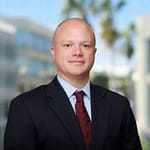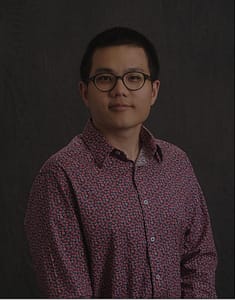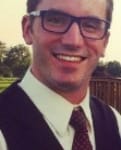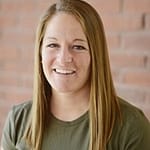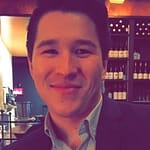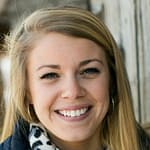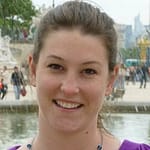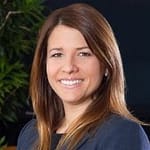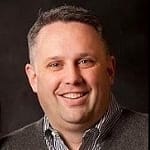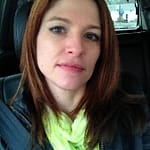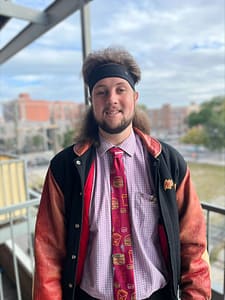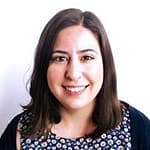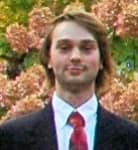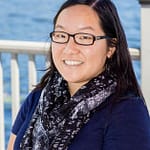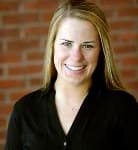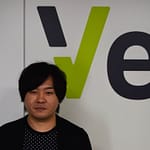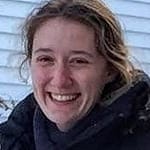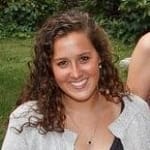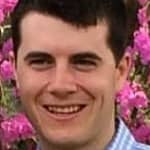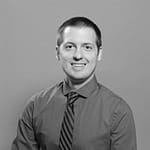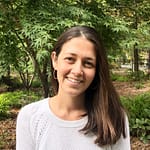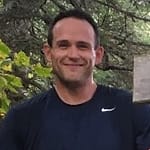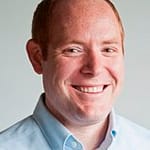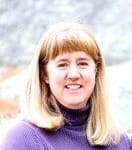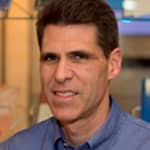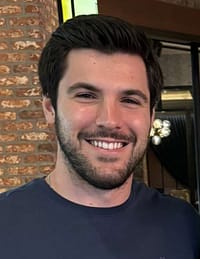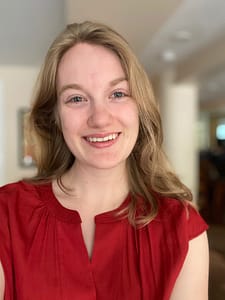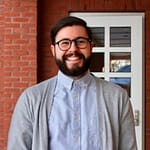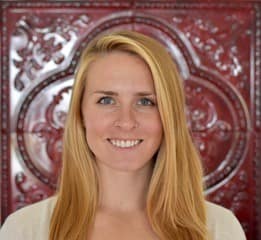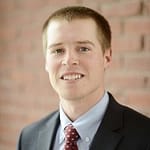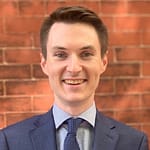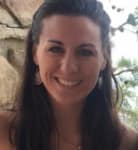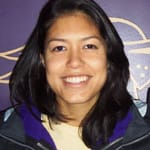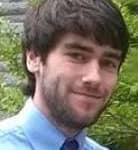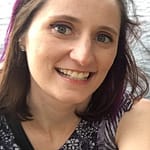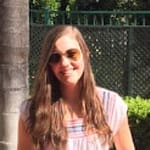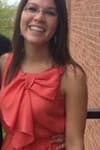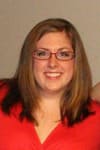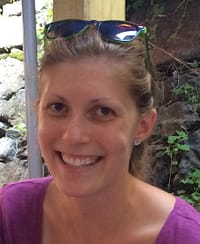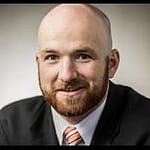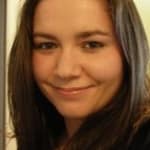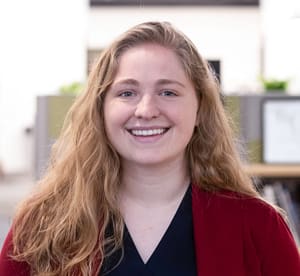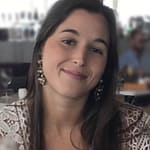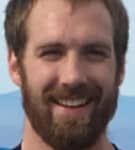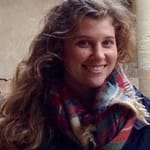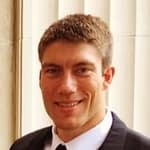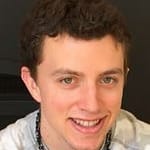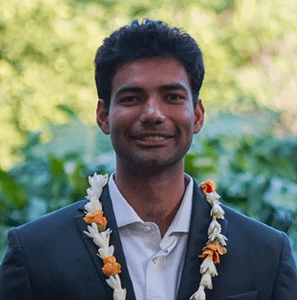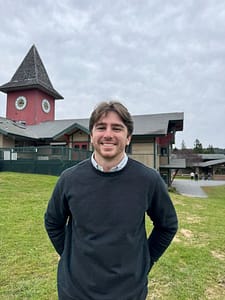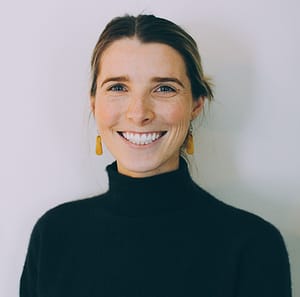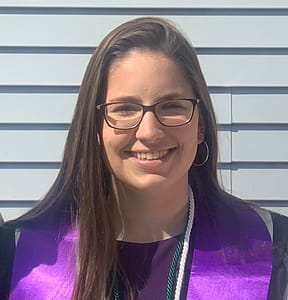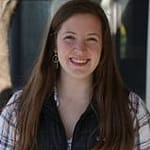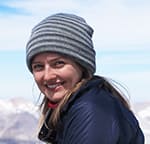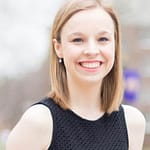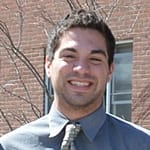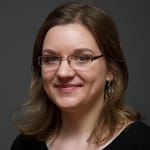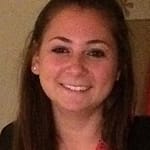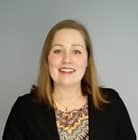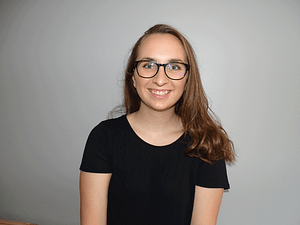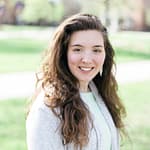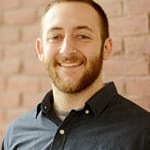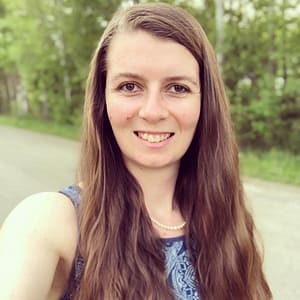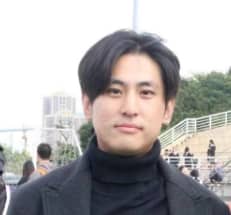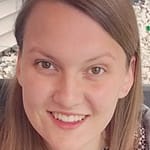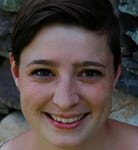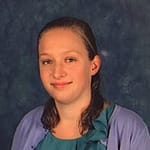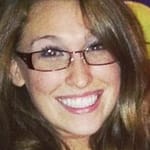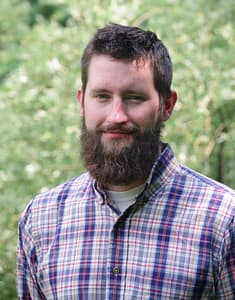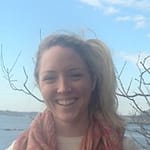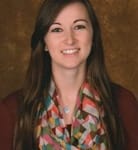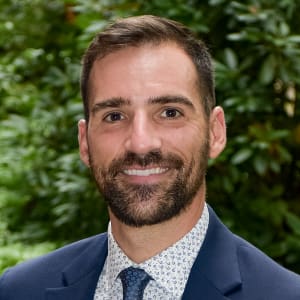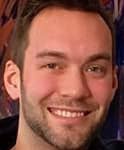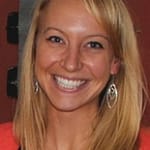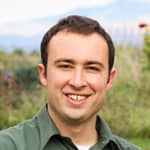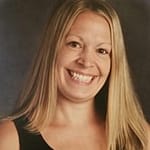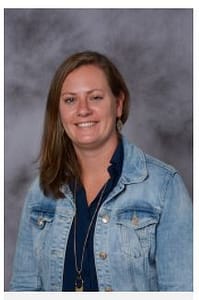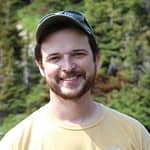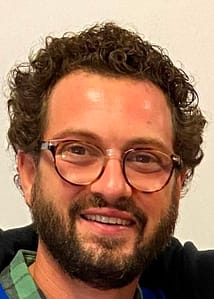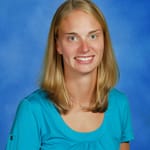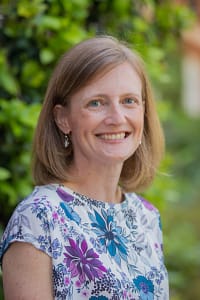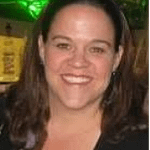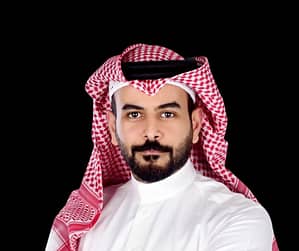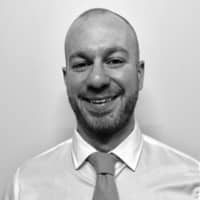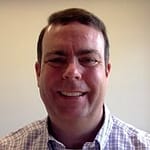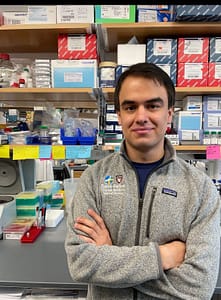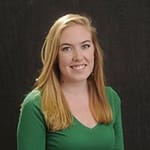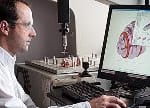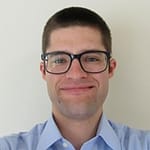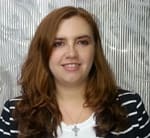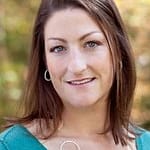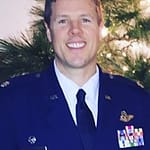Mathematics Alumni in the Spotlight
Many graduates of the Mathematics Department are rapidly advancing in their careers and educational skills. The following pages contain profiles in which alumni provide their current job titles and career descriptions, or career and educational plans for the future. The featured alumni also reflect on how their Saint Michael’s education has prepared them for their professions. Their diverse stories are grouped under more general category links, which are listed below. Click on the links to read their individual accounts.
For alumni who are interested in sharing their information with Saint Michael’s, contact George Ashline, Professor of Mathematics, at gashline@smcvt.edu.
See what our alumni share about their careers in the following areas:
Eileen Mullowney ’12
Born and raised in Burlington, Vermont, St. Mike’s was a natural fit for me. I graduated in 2012 with a major in accounting and a minor in mathematics and went on to obtain my MBA from Clarkson University. After graduating from Clarkson in 2013, I joined a small accounting firm in Burlington and worked towards obtaining my CPA license.
After 2 more years in Vermont, I decided I needed a break from the cold and moved to warm and sunny Bermuda! In Bermuda, I work as a tax accountant for PricewaterhouseCoopers. I specialize in U.S. and international tax compliance and strategy for insurance companies and investment funds.
St. Mike’s mathematics education has provided me with the tools I need to succeed in life, whether it be the problem solving skills needed to pass the CPA exam or the technical and research skills necessary in my day-to-day job requirements. The mathematics professors challenged me to really push myself and that work ethic translated well in my career. Looking back 4 years later, there’s only 1 thing I’d change about my mathematics education at St. Mikes – I’d major in mathematics this time!
Anthony Aliquo ’09
I am currently the Vice President, Controller at Minerva Neurosciences, Inc. in Burlington, MA. Minerva Neurosciences, Inc. (NASDAQ: NERV) is a clinical-stage biopharmaceutical company focused on the development and commercialization of proprietary product candidates to treat patients suffering from central nervous system diseases. The Company’s lead product candidate is roluperidone, a compound the Company is developing for the treatment of negative symptoms in patients with schizophrenia. As the Controller at a small public biotech company, I have several cross-functional responsibilities. Most of my time is spent managing the accounting department though. I find the biotech industry to be exciting as it’s always changing and the science is interesting. My career path has changed a few times, but each step has been very important.
I graduated from Saint Michael’s College in the spring of 2009 and moved to Wilmington, NC in the winter of 2010. Between the winter of 2010 and the fall of 2013, I worked in the mortgage industry, graduated from UNCW with a Master of Science in Accounting, moved to Charlotte, NC, obtained my CPA license, and started with Deloitte & Touche, LLP as an External Auditor. After being promoted to Audit Senior at Deloitte in the fall of 2015, I accepted an international opportunity and moved to Bermuda. I worked in Bermuda for over a year and then moved to Boston to work at BDO USA, LLP. In the summer of 2017, I left BDO and the public accounting industry to join Minerva Neurosciences, Inc.
My mathematics degree and time at Saint Michael’s College helped prepare me to be a successful business professional. The study of mathematics provided me with an excellent basis for accounting and finance. My mathematics background was one of the reasons I was originally hired at Deloitte, which started my career in accounting. My liberal arts studies at Saint Michael’s College also helped me to become a well-rounded person, which has been extremely important professionally and personally. In addition to a great education, Saint Michael’s College has been recognized everywhere I go and great for networking.
Patti Bodkin Martucci ’04
I’m working as the Accounting Supervisor at HarborOne Credit Union where I use my math analytical skills almost daily. I’ve found myself using them in problem-solving approaches to finding discrepancies or recognizing trends in expenses.
I have always had a “knack” for numbers. When I was younger my parents bought me a game called “Smath,” which was essentially Scrabble with numerical equations instead of words. Friends will tease about how easily I remember phone numbers and birth dates and recognize license plates, but it all comes from my love for numbers.
After my first two semesters at Saint Michael’s, I recognized that majoring in Math was the right decision for me. Around that same time I took an Intro to Business course and really liked the accounting portion of the class. The following summer I was fortunate to get a seasonal job in the accounting department of a local bank. Since I was only working for the summer, I covered for almost everyone in the department, which enabled me to understand how the department functioned. My experience there led me to minoring in Accounting at Saint Michael’s, which, to this day, continues to complement the technical and analytical skills I learned in my advanced math classes at the college.
As part of my career growth, I have decided to further my education by pursuing a Master’s in Science of Management focused in Accounting. My math skills have given me a solid base to build from and this degree will better equip me to handle day-to-day decisions and to develop a more thorough knowledge of the business world.
See Patti’s profile on the Mathematics Association of America Web site.
Julie M. Brownell ’02, CPA
I am currently the Assistant Controller for Newburg & Company, LLP, a CPA firm in Waltham, MA. We provide full accounting services; corporate and individual tax return prep, audits, and consulting. Basically, I run the accounting for a 25 person CPA firm. I take care of the books, prepare the financial statements, run payroll, and take care of a lot of the HR stuff (health insurance, etc.) I do some billable accounting work for clients, as we have several clients that we do work for in-house. I kind of get the best of both worlds of accounting, because while usually my position would be considered private accounting, I do work for a public CPA firm, so I still get to work with various clients, and do some consulting work with QuickBooks; and while I do have extended hours during tax season, I don’t have the stress of doing tax work.
I received my CPA in May 2010, and am now licensed in New York State. I took classes at SUNY Albany, Business Law at Hudson Valley Community College, and met my finance requirements online at Empire State College. I had to go to different places based on what was offered when. They require 120 semester hours with a certain number of credits for core accounting classes, business, and economics. A minimum of 150 semester hours are required to sit for the exam, and you may have to have a degree in an approved course in order to apply. This is all for NYS of course, but I think MA has the 150 hour rule as well.
My mathematics degree has helped me a lot, especially in the areas of problem solving and organization. Accounting is mostly plusses and minuses, and just like when solving an equation, everything has to balance. A minus/plus on one side has to have a minus/plus on the other. This knowledge has helped me a lot in understanding how a balance sheet, income statement, and statement of cash flows are related.
Karen P. Robinson ’99
I am a Senior Tax Manager for BISYS Hedge Fund Services. BHFS as a whole provides financial services, including accounting, record keeping, shareholder servicing and tax consulting, to Hedge Funds and Investment Partnerships. Within the tax department, my responsibilities include: assisting clients with tax issues and planning, calculation and review of all applicable tax adjustments, preparation of tax allocations and IRS Forms 1065 and K-1s, development and review of new tax software applications and functionality, and managing and training our group of 20 individuals.
My experience at Saint Michael’s as a math major taught me to think analytically and to visualize a project by its many parts rather than as a whole; both of these mindsets have been key to my success as a tax consultant. Having the ability to think analytically is crucial when working within the tax profession. The logic and reasoning skills learned through mathematical problem solving have certainly added to my success and ability to work with our IT department developing new tax applications and functionality. My ability to communicate and work well within a team was also valued at Saint Michael’s and has proven to be an indispensable trait in life as well as my career.
Megan Tatro Christensen ’06
I work as a Risk Analyst on the Catastrophe Management team at Travelers Insurance. I do statistical modeling of catastrophic risks at Travelers and help create initiatives to reduce that risk. For example, I have been doing extensive research on earthquake risk that I will use to build a tool that will help Travelers determine their potential losses in the event of an earthquake. The loss estimated by this tool will be used for reserving estimations so that enough money is set aside to pay for the losses. I also plan to enroll in graduate school in Spring 2009 at the University of Connecticut to get a M.S. in Applied Financial Mathematics.
My education at Saint Michael’s has helped me by not only giving me the fundamental knowledge in mathematics that I use in my job every day, but also it has given me the confidence needed to succeed in a large company. Without the knowledge I gained at Saint Michaels, both inside and outside of the classroom, I do not think I would be working at Travelers Insurance today.
Gordon Hines ’05
I am currently working at Allied World Assurance Company in Farmington, CT as Vice President and Actuary of Professional Lines.
I began my Actuarial career in the summer between junior and senior year, interning for The Travelers Insurance Company in Hartford, CT as a member of the Actuarial Leadership Development Program (ALDP). Upon graduating from college I was offered a full time position there in the ALDP, along with about a dozen other recent college graduates from throughout the country. Being a part of an Actuarial Development program is a great way to ease into the Actuarial career. At Travelers the program offered numerous educational classes, from technical to business skills; the opportunity to rotate annually to positions throughout the company; and most importantly exam support in the way of manuals, seminars and study time to help navigate the grueling Exam process. It’s a great way to see and learn about many different areas of the company, all while sitting for (and hopefully passing) the many Actuarial exams. I finished my 9th and final exam in fall of 2011, and at that time became a Fellow of the Casualty Actuarial Society.
In the spring of 2014 I joined Allied World Assurance Company. Today I’m the lead Actuary for Errors and Omissions, Cyber Liability, Product Recall and Trade Credit Insurance. As an Actuary I spend much of my time working with underwriters, analyzing the lines of business to assess the profitable or unprofitable segments, and helping to develop new products to expand Allied World’s reach in the market.
My mathematics degree from Saint Michael’s has helped me tremendously throughout my career: from the Calculus and Statistics background for passing exams, to the experiences of smaller, focused classes in my major. Being at a small school, and in a specialized major, classes were much more interactive than they would have been at a larger university, and set a strong foundation for working on teams and interacting with others in a business setting.
Weihan “Bobby” Luo ’17
I graduated from SMC in 2017 with a degree in Mathematics. Later on I attended the Business School in the University of New South Wales in Sydney, Australia and graduated with a Master’s degree in Finance.
Currently, I work in the Rosefinch Fund in Beijing, China, and my position is in Macro Data Research. In my department, we use data from governments across the world, data centers like IMF, OECD and the listed companies to forecast the future trends such as GDP, PPI, PMI, etc. Based on the calculations, we are also trying to predict the future of commodities. We have customers of all kinds. Central Government is using our data as a reference to make the policy; financial companies are using our industry data to predict the stock market; manufacturing companies are using our commodities data to calculate the future cost of their product.
My job requires lots of skills from both mathematics and finance; however, as a researcher, the most important skill is gathering the research method, and this isn’t the skill I can learn from a textbook. Knowing the knowledge of mathematics and finance is helping me during the research such as the calculation process, but knowing the method is like knowing the password of the front door. The skill of method using came from long-term learning, which is exactly what SMC has taught me by the liberal arts education. The skill of method using and the rigorous logic from my math major were all taught at SMC, and that is boosting my career of research at this moment.
I never imagined that I would work in the financial and research area when I was a student at SMC. The skills that SMC has taught give me a wide range of selections and today I will call it the “truly freedom.” In the past three years, I have served in the consulting, economics, and fund industry, and I never feel afraid when I enter a new area because I know the skill of fast learning can help me through every task.
Nate Hodge ’16
I graduated SMC in 2016 as a double major in Mathematics and Economics. Much like Erika below, I interned at PwC in the transfer pricing group in Boston, MA prior to my senior year and was lucky enough to come back after graduating as a full-time associate. In the transfer pricing group, we assist our clients in planning and documenting their intercompany transactions (one entity paying a related entity for manufacturing services, for example) to ensure that they are acting in accordance with the U.S. Treasury, OECD, and other local or global regulations. This is a multi-step process that involves understanding of financial spreadsheets, in-depth research of our clients’ business segments and the industries they are a part of, as well as proper writing techniques.
While my job doesn’t directly utilize math, the quantitative and detail-oriented mindset I developed from my major in math helps me properly organize the multiple phases of the transfer pricing process and enhances my ability to effectively analyze the various functions of our clients and the companies we typically end up comparing their transactions against. The liberal arts education from SMC has also given me a wide repertoire of skills that allow me to shine in a variety of areas as a new associate, such as report drafting and summarizing outcomes from various meetings. All of these skills SMC helped me hone will continue to be of great importance to me as I (hopefully) move up in the firm and take on greater amounts of work and a more communicative role with clients.
Celsey Lumbra ’16
I am a Transfer Pricing (“TP”) Associate. As a TP Associate, I am responsible for assisting my teams with transfer pricing engagements with clients. In general, transfer pricing deals with how related companies (such as a parent and its subsidiary) interact and perform transactions with one another. These transactions could involve tangible property (actual products a company sells), intangible property (such as the know-how and intel behind a manufacturing process or a trademark), or services (such as back-office administrative services, distribution, or manufacturing services). TP projects include contemporaneous transfer pricing documentation to be submitted to U.S. Tax Authorities, advanced pricing agreements to resolve royalty rate disputes between related parties, or the valuation of intangible property (“IP”) in regards to how IP ownership contributes to projected revenues for a company. Projects include several types of deliverables such as generic transfer pricing documentation reports, memorandums, interview notes, slide decks outlining TP requirements in each country a company has operations in, spreadsheets analyzing IP valuations and projected revenues, etc.
I am beginning graduate school part-time at the University of Massachusetts Boston where I will receive a Master’s in Accounting (MSA). This is will make me eligible to sit for the CPA exam in two years.
My Saint Mike’s mathematics education gave me the ability to think critically. Though I am not using the exact content I learned in Real Analysis or Abstract Algebra, for example, I am confident taking these upper-level classes greatly improved my quantitative abilities. This is especially the case when performing an IP valuation, which takes into account the “time value of money” concept – a concept involving the idea that the value of an asset is a function of the costs incurred to develop that asset and the riskiness associated with that asset. Secondly, in the dispute resolution engagement I am working on, we are required to value the bare legal title of a trademark being transferred between two related entities. Though I have minimal finance background, this valuation technique involves the Black Scholes model (a method of pricing options). The Black Scholes model utilizes the normal cumulative probability function – a popular function featured in Professor Yates’ probability and statistics class!
Jeremy Wong ’15
I graduated from St. Michael’s College in 2015 with a degree in Mathematics and a minor in Economics. Upon graduation, I landed a position at VIA Rail Canada in my hometown of Montréal, QC as a Development and Investment Analyst where I was able to put some of the quantitative skills I obtained at St. Mike’s to good use. On the development side at VIA, I was a part of a small team looking to digitize, update and streamline the workforce management process for a large group of employees. As a part of this team, we worked closely with a team of executives to find cost efficient methods of processing payroll data through a newly acquired software and utilized various statistical methods such as regression models to optimize workforce efficiency. As a part of the investment team, we analyzed various financial reports alongside macroeconomic trends to assess investment opportunities for the company’s pension fund.
After a brief stint at VIA Rail, I decided to pursue my education further and enrolled in the MS in Applied Economics program at Boston College. At BC, I was able to use my quantitative background to truly excel in graduate level economics courses such as Data Analysis, Econometrics, and Applied Microeconomics. The big difference in graduate coursework in economics at most institutions is that the material is more quantitative and mostly calculus-based whereas undergraduate programs tend to focus on qualitative findings utilizing simple algebra. Having that strong foundation in calculus and statistics from St. Mike’s was very advantageous in graduate school and allowed me to focus more on understanding the material rather than worrying about knowing how to execute the underlying mathematics.
Upon graduating from Boston College in the spring of 2018, I landed a position in Strategy Consulting at the Maia Strategy Group in Manchester, NH. Consulting was an industry that I truly wanted to get into after getting familiar with it in my first semester at BC and was very fortunate to get the opportunity to do so. At Maia, we utilize detailed primary research and data analysis to assess new market opportunities and growth and go-to market strategies along with performing M&A due diligence and competitive analysis for our clients. While the quantitative workload isn’t all that rigorous, the problem-solving skills and ability to think creatively and arrive at conclusive solutions I obtained through my Math degree at St. Mike’s are utilized every single day. I truly believe that these quantitative and problem-solving skills I developed at St. Mike’s have allowed me to excel in both graduate school and in my brief career in the financial services.
Alison Shappy ’13
I graduated from SMC in May 2013 with a degree in Mathematics and a minor in Economics. I started working at the Vermont Teddy Bear Company in Shelburne, VT in June of 2013 and remained there until August of the following year, 2014. I was a Media Coordinator/Jr. Buyer for VTB at the time. The majority of my position was negotiating and buying advertising space in radio, TV, and print publications. I then moved to Boston, MA in September of 2014 where I continued my work in marketing at Decibel Media. I was a Media Planner, which focused more on building and executing media marketing campaigns for many different clients. It consisted of a lot of strategy planning, i.e. finding the right audience for the particular client, finding out where that particular demographic consumes the most media, finding the most cost efficient way to market to them, planning new and innovative ways to market, and executing these ideas while remaining within our designated budget.
After working for Decibel for about a year, and in media for about two years, I decided it was not my passion, as I wanted to work in a more numbers-based role. I could not be happier to say that in July of 2015, I was offered a job as a Regional Distribution Analyst for the Boston Beer Company. In this role I manage inventory at the wholesale level for 47 different wholesalers in Virginia, Maryland, Washington DC, West Virginia, Florida, and parts of Alabama. My daily tasks include order management, forecasting based on current depletion data and past sales trends, maintaining inventory level and in stock rating at each large wholesaler, and working collaboratively with both the wholesalers and the BBC sales reps in those regions. I am able to utilize my love for numbers and data much more freely in this role than in any other role I previously had. For example, one of our large tasks includes facilitating seasonal transitions when we transition from one season to the next. We have a hard date that we want each wholesaler to transition, so the weeks leading up to this date, I need to make sure the wholesaler will not run long with what they currently have on the floor or they won’t go out of stock too soon if they have too little on the floor. We are measured on our service level (in-stock ratings) and our truck utilization levels. We are held accountable for a portion of the logistics, such as truck weights and routing multi-stops.
My mathematics education and experience at SMC has helped me tremendously in both the media and operations fields. I was able to learn and execute marketing analysis and optimizations at a fast pace. In marketing, you use math more than you might expect. Everything is in terms of CPMs, which is a cost per thousand, GRPs, which is a point measurement system for radio shows, CPCs, which is a cost per click, CPA, which is a cost per acquisition, CTR, which is a click through rate, conversion rates, etc. In the operations field at BBC, I use my math background far more frequently than I did in media, which is why I prefer this position. I had zero supply chain experience going into this position, but was able to pick it up quickly as everything is grounded in math. I am a natural problem solver, as any Math student is, which is an invaluable asset for any employee to possess. At BBC, we forecast hundreds of different products on a daily basis for hundreds of different wholesalers. We calculate in stock rating and out of stock potential leading up to seasonal transitions and adjust our orders based on our findings. Everything is spoken in numbers and metrics. I love that I can ground my decisions, my successes, and sometimes my failures, in the numbers. I attribute all of my successes to my mathematics background from SMC. No matter where my career path takes me, I know that holding that degree and that experience will be an incredibly vital asset.
Brian Goodhue ’12
I graduated from SMC in May of 2012 with a degree in Mathematics and in Economics. At the time I had an internship with the actuaries at National Life in Montpelier, VT. The internship was helped in large part by my connection with the math department; an older classmate who had previously filled the internship put in a great recommendation for me and I landed the role! My internship turned into a “temp full time” position, and I was able to stay on board. Actuarial work was a great application of my math degree and I enjoyed working there, but after the summer of 2012, I decided I wanted to pursue something a bit different.
I changed jobs and worked as a Marketing Analyst for the Vermont Teddy Bear company in Shelburne. This introduced me to more data analysis and database work. After a year and half at VTB, I made a bit switch to work in Business Intelligence at Wayfair in Boston. This was a great opportunity and turned me onto a career that (a) I had never heard of and (b) I found I loved. After a year and a half at Wayfair, I have now moved back to Burlington and work in a similar role at MyWebGrocer in Vermont.
As a BI Analyst, I handle data extraction, transformation and loading to make information available to other parts of the company. The job involves all sorts of computer work, from SQL and Python to Microsoft BI programs. I find the job both challenging and rewarding.
My mathematics degree helped me post-college in a couple ways. First, my degree opened doors in Actuarial Science, Data Analysis, and Business Intelligence, three fields I hadn’t really considered before getting out into the “Real World”. Once in these positions, I was able to use skills I had picked up in school to solve the complex problems that came up. Identifying problems, finding “knowns” and then creating a plan to solve the problem remind me of many of my homework problems from school. My mathematics education taught me the framework for breaking down large problems and using the tools and resources available to create a solution. I believe my math background, my economics background and my complete liberal arts education have set the framework to allow me to succeed in whatever I choose to do.
Erika Kirslis ’12
I am currently working at PricewaterhouseCoopers (PwC) as an Associate in the Transfer Pricing department. I started working in the transfer pricing group at PwC as an intern the summer before my senior year. After graduating from Saint Michael’s in 2012, I accepted a full time position at PwC. Transfer pricing is in the tax practice at PwC and focuses on how related parties price goods, intangible assets, services, and loans as applied to both domestic and international transactions. As an associate, I conduct company, industry, and economic research and participate in functional analysis interviews with clients in order to deliver a transfer pricing report.
My Saint Michael’s education, especially through the mathematics department, has provided me with the tools and confidence to succeed in the start of my career. Although my position at PwC does not focus on mathematics, the mathematics department provided me with many opportunities. In addition, the curriculum at St Michaels provided me the work ethic and determination I now use working at PwC.
Meghan Cary ’10
I graduated from Saint Michael’s in 2010 with a Physics Major and Math Minor. Unsure of where I wanted to go for a career I fell into banking and stayed there until I completed an MBA at Plymouth State University in 2012. I am now the Account Administrator for the Division of Medical Sciences at Harvard Medical School in Boston. Here I work setting up student funding, establishing fellowship accounts and keeping the general ledger. I also process reimbursements and payments to students, faculty and staff. In my first year at Harvard I collected over $1 million in overdue invoices, some were over 3 years past due!
Working in the Cashiers Office and being the Secretary of Finance for the Student Associate at Saint Michael’s College prepared me well for this type of work. I was able to use my learned intuition and skills to adapt to my new environment as well as learn new tasks quickly. Having a solid background in math has taught me a different perspective from others who have come from either business or the humanities. I surprisingly use ideas from calculus weekly! I consistently bring new ideas to my department about how to improve our systems and some have started taking effect! In my spare time, I am the producer for a local theater company called Spotlight Playhouse. I was frequently on stage growing up, so it is a change to see how things work behind the curtain. I use many math skills while balancing our budgets and working through fundraising campaigns! I am proud to have come from a small liberal arts college where I was able to gain confidence in myself and my work.
Lauren (Remmes) Delaney ’07
I am a Manager of Special Projects at Liberty Mutual Insurance in Boston, overseeing the Personal Lines Distribution Campaign Management Operations group. I lead a group of analysts that build and execute campaign requests on behalf of various business units (marketing, sales, service, claims, etc.).
I also completed my MBA in May 2013 at Suffolk University’s Sawyer Business school. This degree, combined with my BS in Mathematics from Saint Michael’s College, has allowed me to be successful in my career growth. The math background allows me to look at business problems and make business decisions using analytics, cost-benefit analyses and root cause problem solving. While my current job doesn’t require me to work with numbers, the math degree helps me to make sound decisions and look at problems analytically. I’ve also been able to pick things up quickly, especially applications, understanding how systems work together, and coaching my staff. A math degree can be used in various career paths; it’s all in how you apply the knowledge and skills you have developed!
Amanda Dargie ’06
I am a Business Management Specialist at J.P. Morgan, working on a nationally recognized wealth management team of 6. We manage high-net-worth individual and family’s wealth and provide guidance with their comprehensive financial plans.
I personally focus on managing client relationships and the financial planning aspects of our business. I serve as the primary advisor for a segment of our client base and am responsible for the management of our team’s overall business model.
In 2012, I received a Certificate in Financial Planning from Suffolk Univ. which helped to deepen my knowledge base in the world of financial planning and management.
My background in mathematics truly taught me how to think outside the box and approach any problem with an open mind. The analytical skills I developed through my math classes are vastly important when reviewing investment portfolios and financial plans.
Chris Higgins ’06
I am working in the financial district of Boston as an Investment Associate at UBS Financial Services. I have my Series 7 and Series 63 Licenses, and I became a CFA charterholder in October of 2010 (the CFA program is a graduate level program for investment professionals). I am also a member of the CFA Institute and the Boston Security Analysts Society. Some of my job responsibilities include: putting together asset allocation models for existing clients; entering and executing both fixed income and equity trades; putting together marketing pieces to present to existing/prospective clients; tracking all of our equity and mutual fund holdings. My responsibilities continue to increase, which I like. I now join the senior person on our team on more meetings with our larger clients and will do solo meetings in the office if he is not around. I also write market commentary every month for some of our larger, institutional clients. I’m glad I have a liberal arts degree because that forced me to do a lot of writing and in addition to all those math proofs!
I would say taking challenging math courses (almost all of them are challenging) really develops one’s problem solving skills and one’s ability to analyze very complicated problems. Finance is a very complex field that requires exactly the type of analytical skills I developed at Saint Michael’s in the math department. Any job in finance requires excellent quantitative skills, which is exactly what the math professors gave to me. I would also add in that the degree in mathematics helped me immensely in studying for the CFA as statistics were a component of all three exams. Finance also uses the same Greek letters as math, like sigma, delta, gamma, etc. so I wasn’t confused by all the new jargon but was actually very comfortable with it.
Matt Baker ’97
I have been at the Chittenden Bank, a division of People’s United Bank, for 11 years. I am a Business Analyst in Burlington, VT, where my daily activities include system analysis, business performance reporting, project coordination, and system application security among other various responsibilities.
I find that my math background from Saint Michael’s, along with the support and expertise from all of the professors in the math department, has given me the knowledge and opportunity to succeed. At Chittenden, we are currently working on a system core conversion which will take us into spring of 2010. I find it a great challenge to coordinate and integrate our current structures and procedures into a new system architecture, but know that I have the tools to get it done. I must admit though, that the true application of ‘Real Analysis’ out in the real world for me has been learning what ‘limits’ my kids can push me to before I give in and spoil them. It ends not being a very complex problem the end. They always win!
Jamie Pitney ’95
I joined TIAA (The Teachers Insurance and Annuity Association) in July 2015. Prior to TIAA, I was with Santander Bank for 15 months and Citizens Bank for 4 years. In my current role with TIAA, I am a Digital Product Manager supporting the online customer experience for TIAA’s digital bank: TIAA Trust Company, FSB. As the Digital Product Manager for the bank, I am responsible for maintaining the online customer experience on a day-to-day basis as well as setting its strategy over a multi-year period. You can see some of what I do on www.tiaadirect.com and www.tiaa.org.
I was previously with Fidelity Investments for 12 years in various roles including product and marketing management as well as finance and operations. I also had a brief stint with Deutsche Bank – Scudder Investments in their mutual fund operations department.
I completed my MBA from Clark University (Worcester, MA) in 2000.
My mathematics education from Saint Michael’s has been very important throughout my career. Overall, I have a much stronger and more comfortable understanding of numbers, in general, than most. This has lent itself to a strong acumen to both the overall financial health of my employers as well as understanding the financial costs and benefits of the business decisions I make each and every day. While I may not assemble the financial statements, I know and appreciate how my decisions will affect them and can make decisions using them as key input.
You can visit my LinkedIn profile page and see my full career path. I would highly recommend that recent or soon to be graduates start to build their profile page and “get connected” to the Saint Michael’s Alumni LinkedIn group. It’s a great way to network with alumni in their professions.
Michele Williams Hudson ’95
I am currently a Principal Systems Analyst for Liberty Mutual’s Global Specialty group. Global Specialty IT supports all of our GS division users around the world as they write diverse and often very specific lines of insurance that can be extremely complex. After 15 years in training, and being Director of Training for the last two years of that, I decided to change back into a more technical role. As a Principal Systems Analyst I act as a bit of a translator. Leveraging my education and training background; my early IT experience as a Business Analyst; and incorporating many of my Executive MBA (Suffolk University) experiences, I help translate our business users’ needs into technical requirements that our development team uses to provide online solutions. It’s interesting how things can come full circle and intertwine with each other when you take a chance and make a change.
At St. Michael’s, I was a Mathematics major, took a few computer science courses, loved my Honors courses, completed a research summer at Syracuse University’s NPAC (Northeast Parallel Architecture Center), and even completed my Secondary Education qualifications. This combination was very well supported by all of my professors and has led me in some very interesting career directions. I have actually applied my statistics courses as a Statistical Process Control trainer and analyst. Various software and management training positions and my current role have capitalized on merging my technical and teaching backgrounds. In addition, my well-rounded education from St. Mike’s provided a good foundation to help me grow into leadership positions, as well as create and facilitate various training programs for managers around leadership, coaching and interviewing skills. Take a look at my career details if you are interested in more information Michele (Williams) Hudson LinkedIn. As Jamie Pitney mentioned above, LinkedIn is a great resource for networking and sharing your professional experience.
We hear more and more how “traditional career paths, or career ladders” often don’t apply anymore, and this has certainly been my experience. I am certain that the wealth of opportunities and diverse education that I received at St. Michael’s has been a key factor in allowing me such career flexibility. Use your time at St. Michael’s and beyond to soak up the knowledge, then head off in a direction that feels right for you. And remember, a decision, or a path, is not absolute, and you CAN change your mind. Take a chance, learn and grow, and let life surprise you as much as it may delight you!
Eric Caputo ’92
I am Partner at PricewaterhouseCoopers. I completed a master’s degree in mathematics at the University of Vermont, an MBA at Northeastern University, and I have worked in transfer pricing for more than 12 years. My projects include: establishing global cost sharing and intangible property migration strategies (for multi-billion dollar manufacturers of semiconductors and pharmaceutical and consumer products); performing economic analysis relating to intellectual property structuring and migration (for software developers and other manufacturers); and preparing transfer pricing support (for IRS audits, advance pricing agreements, and competent authority proceedings).
One thing I’ve learned is that having a strong quantitative background and education is immensely valuable for any career. Although I may not daily use my college and graduate mathematics directly in my job, the solid foundation and training that I received at Saint Michael’s College has benefited me throughout my career.
Zachary Hinds ’23
I graduated in Spring of 2023 with a double major in Mathematics and Computer Science along with a double minor in Philosophy and Data Science. At Saint Michael’s College I also tutored Calculus one, two, and three over the four years that I was there. During the summer after my junior year of college I had an internship for the McDonald’s Corporation as a Software Engineer. I got this internship during the fall semester of my Junior year; the support of Saint Michael’s faculty and professors allowed me to pursue my goals with an amazing amount of support.
For the internship I had to move to Chicago, Illinois where the McDonald’s global headquarters is located. During the internship I was placed onto a software development team where I was to learn the ins and outs of how McDonald’s goes about software development. I am sure that all of you reading this know about the delicious consumable items that McDonald’s offers, but I believe that the technology that goes into supplying and serving that food often goes unnoticed. In recent history McDonald’s has implemented more and more technology including, but not limited to, the Point-Of-Sale machines, the Kiosk, and of course the mobile app. As an intern I was placed onto a team that works on the mobile app, specifically on the portion of the app that helps you save money, offers and loyalty. The internship was everything I hoped it would be, I made incredible connections with people at the company and I was able to start down a path that I had been dreaming about since high school: becoming the CEO of McDonald’s. After the internship, during my senior year, I received a full-time offer and completed the rest of college knowing I was preparing to go back to McDonald’s and pursue my dreams.
Having been in Chicago for a few months now, working for McDonald’s as a Software Engineer is more fun than I thought a job could ever be. The people at the company are nice and willing to help whenever. My current responsibilities as a Software Engineer at McDonald’s are to improve and innovate on the current state of the app. For instance, I work on converting code that is outdated to a faster and cleaner state. Along with that if there are any new features that must be added, I am on the team that will work to implement the changes needed for the new improvements. With these responsibilities I do run into issues, but my education at Saint Michael’s College prepared me to be able to logically work through any problem that I encounter, whether it be a social or technical problem. I know that with my experiences I have the composure and ability to overcome it.
Rebecca Rouleau ’18
I work at Epic Systems in Verona, Wisconsin, as an Integration Engineer. Epic develops software to support healthcare systems and maintain an integrated and robust Electronic Medical Record (EMR) for patients. When healthcare systems integrate with other systems and need to exchange data, they do so using interfaces. I work with healthcare organizations’ IT teams to test, implement, and support these interfaces, as well as to give recommendations on the best and newest ways to exchange medical data. I also focus on conversion implementation projects where we take medical data from an organization’s former system and bring it into Epic so doctors can seamlessly care for patients once they go live with Epic.
No two days are the same at my job — I typically split my time between implementation and support work. I lead and participate in project tracking meetings and troubleshooting sessions, and I travel onsite one week per month to spend time working “in the weeds” with my analysts. Internally, I have ownership roles in the training & learning and conversion areas.
My studies in mathematics and computer science at Saint Michael’s prepared me to thrive at Epic. These subjects taught me attention to detail and problem-solving, and a broader liberal arts education helped to provide me with communication and organization skills essential for managing multiple projects simultaneously and working with a large number of people across the nation.
If you have any questions about my education at Saint Mike’s or my role at Epic, please feel free to contact me at rrouleau@epic.com.
Bri Healy ’16
I currently work at Epic Systems in Verona, Wisconsin. Epic is an international healthcare software company that develops and maintains electronic medical records. I work with three US hospital systems to support the Inpatient Orders and Infection Control applications as a part of the technical services division at Epic. I work closely with these community member’s internal IT teams to support their inpatient physicians and infection preventionists. Additionally I assist with their regulatory reporting to the Center for Medicare and Medicaid Services and the National Healthcare Safety Network, a branch of the Centers for Disease Control. Internally I host bi-monthly technical webinars and work on code for diagnosis association.
Each workday is different. Depending on what my community members are doing at a given time I could spend part of my day building out a functionality, writing a search in M or SQL to pull data, troubleshooting/debugging code to determine why something may not be working as expected, or researching how I can use the software to achieve my customer’s unique wants and needs. I’ve had the opportunity to travel about one week per month to various community members. During these trips I work directly with IT analysts and/or clinical end-users to ensure the software is used as effectively and efficiently as possible so that there is less time spent charting and more time spent providing direct patient care.
At Saint Michael’s I received training to break down an issue or problem and logically work through steps to find a solution. This is exactly what I do on a daily basis in my work as a technical problem solver. More specifically, computer science courses taught me the basics of reading and writing code and statistics introduced me to the skills I now use for examining things such as the likelihood of a patient’s readmission or surgical infection rate models.
If you have any questions about my position or Epic, please feel free to reach out to me at bri@epic.com.
Sam Blakely ’15
I am currently working as a Technical Consultant at Galen Healthcare Solutions after graduating in the spring of 2015. Galen is a consulting firm that has been in the healthcare tech industry for ten years. At Galen, my projects have revolved around developing solutions related to ‘Electronic Medical Record’ databases. For example, I have been contributing to a statewide project in North Carolina extracting data from private practices and hospitals, and organizing it so it could be accessed by medical providers across NC.
We face challenges such as evaluating logical arguments, anticipating special cases, graphically representing complex information, and learning new technology. Internally, there is a strong sense of team collaboration that gives both learning opportunities and challenges in coordinating group problem solving. Beyond the technical problem solving, we often need to communicate with clients from a less technical background. This requires that we translate our solutions to include less-technical individuals in a discussion. It is exciting to combine interpersonal and problem-solving-oriented sets of challenges.
The time I spent at Saint Mike’s played an absolutely crucial role in my ability to succeed at Galen. Starting with the analytical skills developed in the Math and Computer Science departments, and supplemented by the rich liberal arts educational background, I feel very comfortable moving forwards applying skills I learned and gaining new ones. Additionally, Saint Mike’s taught equally essential social and personal lessons that are just as important as the technical abilities. If you have an interest in carrying your skills gained at Saint Mike’s over to the consulting world, or have other career interests, please feel free to reach out to me at Samuel.Blakely@galenhealthcare.com.
Mary Falcigno ’15
I began working as a computer scientist for the U.S. Army out of Picatinny Arsenal in October 2015. The program I joined was a three-year career development path leading up to the permanent position I am current holding as of October 2018.
Throughout my time at Picatinny, I have been assigned to various projects looking at a variety of different technologies. In the beginning, I worked with a group that supported the infrastructure and sustainment of an SAP system. My team and I learned the functionality of various modules within the system and developed online training courses for soldiers learning how to use the module. Only a couple months later, I began working on more technical, hands-on projects. With one of the first projects, I learned about and worked with the cybersecurity of industrial control systems (ICSs); this project taught me the foundation of cybersecurity and basics of ICS development. More recent projects involve artificial intelligence (AI) and machine learning (ML) and heavier application of data sciences. Each of these projects have included great training opportunities to better myself technically and develop my leadership skills.
The strong mathematical background given to me at Saint Mike’s has made me a unique team member in my time at Picatinny. While my job title labels me as a computer scientist, my mathematical background has given me the chance to participate in projects that require stronger linear algebra and statistical foundations, particularly in projects surrounding AI and ML. My management has acknowledged my interest in math and has put me on projects allowing me to use what I know and expand that knowledge.
Kate Garaffa ’14
I graduated from Saint Michael’s in May 2014 and obtained a marketing position with Dealer.com in Burlington, VT. Having had multiple marketing internships throughout college, I thought that it was what I wanted to do. At Dealer.com I was introduced to the coding word with HTML/CSS and realized then that I wanted a career in website design.
I moved out of Burlington and took a JavaScript development class through General Assembly and started to apply for jobs focused in website design. I then worked as a Website Designer with Propel Marketing in North Quincy, MA. Propel Marketing provides marketing services to small and medium size companies across North America.
Currently, I am employed as the Integration Lead with SilverCloud in Portsmouth, NH. SilverCloud is a SaaS company that gives banks and credit unions the opportunity to self serve with our platform. At SilverCloud, I am responsible for creating the intranets that the banks and credit unions interact with to find their answers using HTML, CSS, React, and JQuery to make the pages interactive and functional. I thoroughly enjoy when problems arise, and I am given the opportunity to dive deep into the code to find out why.
My time at Saint Michael’s helped me in many aspects of my career and who I have become. The connection with professors I created, thanks to small classroom sizes, helped me have a professional reference post-graduation. Although I do not use math directly in my day to day tasks, there are many positive takeaways from my degree in mathematics. The reinforcement of different computer programs in different courses helped me obtain an attention to detail necessary for coding. The rigorous curriculum the math department demands has helped me persevere through any problem faced at work by figuring out what the issue is and creating a step by step plan to solve/fix it. I owe a huge thanks to the Saint Michael’s community for giving me the opportunity to become who I am today.
Ryota Ishisaka ’14
I currently work as a member of Technical Operation team at Ve Japan, an affiliate of Ve Interactive for the territory towards Japan/Australia/NewZealand/Korea, which provides solutions for various websites to prevent their customers from abandonments. The team of Technical Operation takes charge of all processes of integrating our services to our clients’ websites or web services. To name a few of my team’s processes, our team analyzes the structures of websites, issues JavaScript tags that will be set in the websites, designs drafts of advertisement creatives, and tests that the creatives work properly in the websites. In addition to our normal processes, our team also contacts clients a lot via e-mails, phones, and actually at their offices.
The position requires from me flexibility and patience when I explain our company’s services to clients (as you may know, not everyone in the world knows well about how Web works, JavaScript behaves, etc!), when I make the clients’ campaigns successful with colleagues of different positions such as sales, and when I have to investigate problems such as not showing creatives properly in the websites. To summarize, I need abilities to understand and digest technical knowledge and then to deliver those information and skills correctly to whomever is not very much familiar with technology (I’m like a “bridge” from technology to people.)
The undergraduate education that I received at Saint Michael’s College truly is the foundation for my success at Ve Interactive. Thinking analytically, logically, and critically which I learned in Mathematics supports me when I communicate with clients and colleagues and when I create technical documents for my company. How websites work, how JavaScript realizes specific operations on websites, and how background systems and frontend systems interact when the campaigns are on live which I learned in Computer Science supports me to deliver daily tasks in my team. Double majoring in Mathematics and Computer Science very best matches to my current position.
My company was just founded in Japan and is growing rapidly day by day. There are numerous styles of working in Japan. Working in such a growing company is challenging but every day is very exciting. If you want to know more about working in Japan or want to spend your days in the exciting and fascinating environment with colleagues/clients from all over the world, please contact me at ryota.ishisaka at veinteractive dot com. (You can also visit our website http://www.veinteractive.com/jp (Japanese) or http://www.veinteractive.com/ (English).)
Julie Mullowney ’14
When I started at Saint Mike’s I was an ‘exploratory’ major unsure of what to study and what profession I wanted to pursue. I took classes in almost every major, including computer science which I wrote off almost immediately. Instead, I pursued Math where I learned how to approach problems and to think dynamically.
After graduating Saint Mike’s in 2014, I worked for a financial firm in Boston thinking this would involve the same problem solving I loved. However, I found that it was more statistical analysis then logic. After two years, I decided to return to Vermont and was able to use my experience and talents to land a position as an Application Systems Analyst at Vermont Gas Systems. My current duties include proving end-user support for the company’s numerous software packages. I review, analyze, and modify corporate ERP and client programming systems. Unlike most Systems Analyst positions, I also manage all the reporting including MS Queries, Crystal Reports, and SAP analytics. I primarily use SQL logic to write and produce accurate reports for end users.
I use math the most when coding or writing logic-based reports which, ironically, I struggled with when I started at Saint Mike’s. Having a math major not only prepared me for my jobs, but it also changed my outlook on coding and computers. My math education provided me with the tools to do my job and Saint Mike’s gave me the confidence to challenge myself. Should you have any questions or just want some helpful advice, please don’t hesitate to reach out! jamullowney@vermontgas.com
Emma Hauser ’13
I am currently an Implementation Team Lead with Epic, located in Bristol, United Kingdom.
I began my work with Epic in Verona, WI in August of 2013. Epic makes electronic medical record software for mid to large size medical groups, hospitals, and integrated healthcare organizations. I work on the Access side of the system, specifically focused on patient scheduling, referral intake, and insurance interfacing.
I’ve just recently hit my six and a half year mark at Epic, and throughout those six years I have worked in multiple different areas of the company. For the past four years, I’ve been on the Implementation team, and now hold the role of Implementation Team Lead. My responsibilities include working side by side with customers to install Epic software, on-the-fly problem solving and support, and direct management of other implementers across teams. No two days are the same, as each problem or workflow I’m looking to solve is unique to the organization I’m working with at that time. In my 4 years in this role, I’ve been fortunate to work with variety of organizations, including but not limited to safety-nets, large academic hospitals, community hospitals, and multiple hospitals/organizations outside of the United States.
Outside of my main role, I am able to use the computer science and mathematics skills I learned at Saint Michael’s in maintaining a variety of excel and SQL based set of tools that help other implementation staff evaluate external data through SQL. These tools give build suggestions, uncover best practices for implementations, and allow for easier conversion from legacy software over to Epic.
Prior to my role on the Implementation team, I worked at Epic as a Quality Assurance team member and team lead, overseeing the overall software quality, managing team member workloads, and working with the development team lead to prioritize new projects on the team.
Saint Michael’s College, and majoring in Mathematics, prepared me for the technical troubleshooting and problem solving that goes into implementing and troubleshooting healthcare software. But on top of that, the professors, especially those in the mathematics department, the athletics, and campus life at Saint Mike’s provided me with the social, moral, and critical thinking skills necessary for success in any career role I might face. SMC provided me with the capability to pick up technologies quickly, adaptability in tricky situations, and the self-awareness and confidence to grow as a manager and work with many different personality types, all skills essential to my career growth.
For more information regarding my position or Epic, please feel free to contact me at ehauser@epic.com.
Eric Parziale ’13
I am currently a software engineer with Goldman Sachs Asset Management in Burlington Vermont.
Before joining Goldman, I spent two years as a software developer at Credit Suisse in New York City. At CS I worked as part of the bank’s equity swap trading team, where I enjoyed the fast-paced environment of financial software. My team interacted with traders on a daily basis, built and maintained high-volume trade processing applications, and provided data analytics for a global business.
Building on that experience, I was fortunate to earn an opportunity with Goldman’s fixed income team in Burlington. My team directly supports the bank’s stable value portfolio management desk, and I continue to enjoy the mix of business and technical challenges here.
Looking back, I’m very thankful for the time spent at Saint Mikes. I was fortunate to have support from the college’s alumni network throughout my four years, and I believe that the culture and community at Saint Michaels shaped the person I am today.
Whether asking questions in small classes led by knowledgeable and passionate professors, engaging in sports and activities on campus, or learning how to start a conversation while riding a chairlift at Smuggs, SMC presents an invaluable learning environment. It’s this unique balance of opportunities that really differentiates the college and helps students grow into their potential.
Emily Pratt Farnham-Haskell ’12
I am currently working as a Proposal Design Consultant at National Life Group. National Life Group is a financial service company that offers life insurance and annuities, and it is located in Montpelier, Vermont. I began working at NLG over ten years ago as a Product Development Actuarial Intern. I held that position for 7 months and then transitioned over to a job on the illustration’s team (the team that I am still on today).
I worked two days a week the Spring semester of my Senior year and began working full-time the day after I graduated from Saint Michael’s College. I still work closely with the Actuaries that I interned with, but as opposed to helping create & price the products, I now bring them to life in the illustration system.
I spent my first five years on the team testing our illustration software. That included reviewing requirements, writing test cases, performing tests and managing defects. I then transitioned to a role on the team where I designed and developed the illustration output. While testing was still a huge part of this new role, I also had the chance to get creative by designing simple, clean, and modern illustration output and the chance to learn to develop in C#. Early in 2020, my role shifted again, and I was offered the opportunity to manage a team that designs, develops, and tests the illustration output. In this leadership role, I have had the opportunity to continue to do the designing and developing that I have grown to love, but I have also had the opportunity to learn a completely different set of skills: coaching, empowering, communicating and developing (just to name a few).
Saint Michael’s prepared me for life after college at National Life Group. A fellow SMC alum who worked at NLG helped me to get my foot in the door through my actuarial internship. The power of SMC’s network in action!
By majoring in math I learned how to problem solve…a skill that has served me very well in my role today. My love and understanding of numbers has also served me well. While I am not on the team that tests the values within the illustration system, my familiarity with the values and how they work allows me to jump in and help that team as needed.
I am extremely thankful for the education that I received at SMC and for all the professors who were so critical in my experience & growth.
If you are interested in pursuing a career at National Life Group or in software testing/design/development/leadership, please don’t hesitate to reach out any time: efarnhamhaskell@gmail.com.
Michael Commo ’11
Saint Michael’s College jump-started my career in software development. Not only was I better prepared for industry than I could have reasonably expected, but the workshops and tools that St. Mike’s offered to assist with resume-building and to provide mock-interview experience were invaluable when it came time to job-search. These amenities, along with dedicated support from professors in the computer science and math departments, are some of the primary reasons why I had the opportunity to begin my career at IBM.
I joined IBM when I graduated in 2011 as a Software Engineer. I developed ETL (extract, transform, load) software to continuously load the manufacturing information data warehouse. I also had the unique opportunity to help design and develop a prototype warehouse designed for aggregating financial and technical data to enable near-real-time reporting of business operations statistics. I was quite thankful I’d decided to pursue the math minor alongside my computer science degree given my career quickly focused on data analytics and business intelligence.
I prefer (and thrive in) close and tight-knit environments; it’s one of the reasons why I chose to attended St. Mike’s. It’s the same reason I inevitably left Big Blue in favor of a smaller firm. I joined Galen Healthcare Solutions in 2013, a healthcare IT consulting company only a few miles from the St. Michael’s campus. I started out providing technical consulting services to Galen’s clients: I’ve assisted clients with data conversions, implemented data warehouses, built reports and developed custom software. I’d never expected to work so directly with clients while in industry, but the liberal education I received from St. Mike’s prepared me with the interpersonal skills necessary to handle client interactions professionally and gracefully. Before leaving Galen in 2016, worked as a Senior Software Engineer developing products designed to supplement electronic health records (EHR) systems. EHR systems tend to be large, complex, and sometimes unwieldy; despite that, they are also vital tools in providing quality patient care. The goal with this product was to ensure patient care is seamless and continual, ensuring where data is stored doesn’t get in the way of providing excellent patient care. I credit Galen Healthcare, and its experienced development team for really teaching me how to build software properly.
I left Galen for an uncommon opportunity, and an unbelievable challenge. A local startup named DealerPolicy with a unique vision and a prototype software product was looking for an Architect to shape the product and development team. The company’s vision was simple and elegant – try to save people money on car insurance at a time when they’re most likely to switch carriers: when they’re buying a new car. Sounds like a cliché commercial, but it’s more than that – if we can provide dealership customers with the best insurance at the best rate, and provide dealership employees a compelling tool to make their sales process easier and more intuitive; and you’ve got a powerful insurance lead generation tool. I began my role as Senior Software Architect by taking ownership of the product and ramping off the outsourced development team initially contracted to build it. Since then, we’ve built a fledgling engineering arm of the company that’s focused on transforming the prototype website into a scalable/enterprise-grade software product/solution that can continue to support the business and its multitude of dealership customers as the company aims to take its vision national. While I’m responsible for product development and ensuring the cloud-based production systems that our dealerships use daily are working, the most fulfilling aspect of my daily routine is getting the opportunity to mentor new engineers on the craft of software development. As professors, classmates, and former colleagues from St. Mike’s, IBM, and Galen once mentored me, I get to watch and help new team members grow their skills and craft. Being able to pay that debt forward is quite gratifying. As a company, we’ll continue to grow our engineering team, and cultivate our newer engineers so that we may build a product so compelling, it’ll be used by the dealership you buy your next car from; and we hope at that time that we’ll be able to save you money on car insurance.
Thinking about a future in software engineering? Considering attending St. Mikes? I’m happy to chat: mcommo@dealerpolicy.com.
Edward Hakey ’11
I began my career with National Life in Montpelier, Vermont as a Corporate Actuarial Intern in September of 2010. In the spring of 2011 I took a permanent position in Product Development as a Business Analyst working with and supporting the actuaries who price our Life Insurance products. While working under the title of “Business Analyst”, I helped to lead an effort to rebrand our positions as “Actuarial Systems Analysts”. Our day to day tasks focused on the testing and validation of the systems used to illustrate and administer our products. While the actuaries were charged with developing the formulas used for calculation of premiums and charges of our products, my area was tasked with assuring that the formulas and calculations were properly implemented by developers on the systems. This effort required the development of test plans and strategies as well as individual test cases and scenarios specific to the product and system being tested.
My experience testing in a product specific role lead to me being offered my current position as “Quality Assurance Lead” in the newly formed Business Delivery Office in early 2015. The BDO as an organization offers such services as organizational design and opportunity, strategic roadmap development and planning, quality assurance, business analysis, project management, and process improvement. As a part of the Quality Assurance team, I am heavily involved in the majority of software and testing related initiatives throughout the company as a whole. We lead efforts to develop test strategy, planning, coordination, execution, and reporting on an individual basis as well as tailoring each of these to the specific needs of each project.
My time at Saint Michael’s College prepared me well for my career with National Life. My background in mathematics and computer science allows me to think logically as well as analyze and mediate any risks to project delivery. Much of my job requires me to communicate clearly and efficiently with IT Developers and Programmers as well as Business Users and Stakeholders. This requires an extensive technical background and also the ability to keep up with the ever changing business trends of the Life Insurance industry.
For more information about me, Quality Assurance, or opportunities with National Life, please feel free to contact me at ehakey@nationallifegroup.com.
Kate Berry ’09
I am a Customer Success Specialist in the Systems Engineering group at Avid Technology in Woburn, MA. I’ve been at Avid for a little over a year and I really love it. The product I support is called Interplay Media Asset Management (MAM for short), which is essentially a big database used to store video archives. There’s a lot of customization involved at each site, which means they’re all set up very differently, and one of the ways they’re customized is via short pieces of code called workflows. They’re written in a proprietary coding language, but it’s really similar to some of the languages I learned at St. Mike’s and a lot of the time when I’m troubleshooting an error for a customer, I start with the following the code in the workflow.
Most of our customers are big tv stations, like NBC, CBS, Supersport (in South Africa), Caracol (in Columbia), and M6 (in Paris) to name a few. The coolest thing I’ve gotten to do so far was work tech support for NBC Sports during the Sochi Olympics – my name was even in the credits. I work on issues for customers all over the world, so I talk to people in France, Germany, South Africa, Ukraine and Columbia (to name a few) on a fairly regular basis, which is also pretty awesome. Plus I work with a great group of colleagues, which I’ve found is extremely important.
My education at St. Mike’s definitely provided a foundation to thrive in this industry. My double major enabled me to have a strong background in mathematics as well as computer science. Obviously, the CS background has helped when debugging code, but the logic I learned in my math classes has been key – you’d be surprised how many times errors are caused by improper use of parentheses. In addition, the Liberal Studies aspect of my education at St. Mike’s has been extremely valuable. In today’s world, there is a shortage of technical people with the ability to express themselves to non-technical people. Between Liberal Studies requirements and peer tutoring, I left St. Mike’s with all the necessary skills to work efficiently with both customers and engineers.
Claudette Foisy Fowler ’09
I currently work at MathWorks, a developer of technical computing software located in Natick, MA. MathWorks develops two main products, MATLAB and Simulink. I work as a technical writer for the MATLAB product, specifically with the graphics team. As a technical writer, I write user-focused content and develop examples to show how to use the software. Before working at MathWorks, I completed a Master’s in Mathematics at Clarkson University where I worked as a research assistant and a teaching assistant.
My education at St. Mike’s provided me with the strong mathematical background necessary for pursuing graduate school. The professors provided a great balance of pushing students to work hard while always being available for extra help outside the classroom. The extra push to work hard as an undergraduate has helped ease the transition to the heavy workload of graduate classes. My classes at St. Mike’s also introduced me to the concept of using software to solve mathematical equations, which eventually led to the job I have now! One thing I will never forget about my experience at St. Mike’s is the approachability, encouragement, and support I received from all the professors in the mathematics department.
Aaron Desrochers ’04
In 2008 I started working as a software developer/bookkeeper for Data Systems Inc., a Burlington-based software company that specializes in customized order fulfillment, accounting, and E-commerce solutions. The logical principles I acquired in my mathematics education helped greatly in the transition to programming logic in PROIV, a fourth generation rapid application development language. Accounting principles were easy to pick up on, especially after getting through Calc III and Real Analysis!
Data Systems is structured as a worker cooperative; I’ll admit before I began working at DSI I had never heard of a worker coop before. For those in the same boat as me, worker cooperatives are business entities that are owned and controlled by their members, the people who work in them. So after a year of satisfactory employment I was offered the opportunity to purchase an ownership share in the Data Systems coop. I accepted and became one of Data Systems worker-owners. A few years later I became Data Systems’s president after a vote by the board of directors. I wear a lot of hats currently as is common at many worker coops and am involved in software development, customer support, business administration and sales.
Working at DSI has truly been a blessing, as a worker owner I have to opportunity to be my own boss and have a say in the direction of our company, as well as a share in the profits. We are currently supporting clients using legacy software applications, but hope to work on some new web-based applications for the wider ‘Coop Economy’. Currently I am an organizer for a burgeoning network of worker coops in Northern VT, known as the Green Mountain Cooperative Alliance.
Most importantly for me, my work/life balance is excellent and I have the freedom to spend lots of quality time with my wife, our 5 year old son, and 2 year old daughter. I truly believe that my mathematics degree from Saint Michael’s has helped me stand out from the crowd at every job interview I have ever been on and has opened many doors for me so far. My thanks go out the fantastically dedicated teachers at Saint Mike’s who helped make this all possible!
Michael Duquette ’03
I am current working as an Information Technology (IT) Specialist at the Department of Homeland Security (DHS), United States Citizenship and Immigration Services (USCIS) after graduating in the Spring of 2003. I worked as a student intern while attending SMC and have been with the Federal Government for over 15 years now. USCIS processes applications and petitions for immigration and citizenship benefits, promotes an awareness and understanding of citizenship, and ensures the integrity of the United States immigration system. I work for the Office of Information Technology (OIT) within USCIS where we provide the information technology expertise and the strategic vision necessary to enable USCIS to deliver immigration services and products. My role at USCIS has changed over the last 15 years, as the needs of the agency have changed post-9-11. I began my career with an interest in computers, technology in general, and a technical background thanks to my mathematics degree, that assisted me with analyzing requirements and coming up with creative solutions to the complex challenges that face immigration and Government bureaucracy.
I started out at USCIS providing end-user support, and quickly moved onto managing a server environment and creating websites which I love to this day. Today, my role within the organization has changed drastically. I decided to become a Project Manager and Contracting Officer Representative (COR) overseeing multi-million dollar IT contracts on behalf of USCIS. I primarily manage our Mobility contract that consists of over 6,000 smartphones/tablets and our virtual desktop solution that allows users to remotely access the Network from any of their personal devices. My degree in math is not fully leveraged, but my love of numbers that came from my time at SMC has assisted me with preparing multi-million dollar budgets, reconciling invoices, and performing data analysis in MS Excel/Access. A math degree from a college with SMC’s reputation has opened doors for me within the Federal Government to move around the organization based on what I would like to do next, because they know I am fully capable of handling the challenge.
Tim Proctor ’97
For the last 17 years, I’ve been working at Physician’s Computer Company (PCC) based in the Champlain Mill of Winooski, VT. PCC is a medical software company specializing in providing software and practice management solutions to about 200 independent pediatric practices nationwide. PCC has existed since the early 1980’s and truly was a pioneer in the medical software industry providing billing, scheduling, and practice management software to pediatricians for over 30 years. We have since added Electronic Health Record (EHR) clinical software and practice management consulting services.
I started at PCC in 1999 working as an Installation, Training and Support Technician providing software and hardware support and training for our clients. I have since visited dozens of pediatric practices, installing and training administrative and clinical staff on PCC’s software. In 2005, I began working as a consultant to our clients, performing personalized financial assessments. Since then I have developed, maintained, and supported an online Dashboard application allowing pediatric practices to see key performance indicators compared to industry benchmarks. I have also become a subject matter expert in the realm of financial and clinical reporting and help our clients understand the ever-changing health care industry while also staying competitive.
Soon after graduating from Saint Mike’s I realized that I found great joy in teaching and helping adults understand technology. While I enjoy the analytical part of my job (the data analysis and web development for example), I find that what I like most about my job at PCC is traveling to pediatric practices and helping them implement our software. There is a great balance of customer service and data analysis in my job and I feel that the liberal arts education and experience at St. Mike’s prepared me well for that. In particular, the mathematics and computer science classes that I took have allowed me to excel at data analysis and programming, both of which are an integral part of my job.
Many thanks to all the educators at St. Mike’s who challenged me and taught me skills and knowledge useful in both the workplace and in life. I began telecommuting to PCC in 2010 when I moved to Cape Elizabeth, Maine where I now live happily with my wife and two kids.
Kimberly Corbeil Martens ’85
I have just celebrated my 30th anniversary with Liberty Mutual Insurance Company. I have had various positions thru the years and most recently am managing a team of Security Analysts on Directory Services in the IT Hosting Security Operations department. While Liberty Mutual is primarily an insurance company, IT is key to enabling the entire company to achieve its strategies and business objectives. LM has a large technology team that combines technical know-how and business savvy to bring real-world results. Liberty Mutual IT provides the business with innovative applications, computing, security and communication services. Liberty Mutual IT has evolved thru the years and I am continuously challenged and learning, adapting to changing environments, and applying my skills to make a difference. I work with great people and Liberty Mutual offers in-depth technical training along with the soft skills training needed to work successfully.
I still have many fond memories of Saint Michael’s! From the basketball court to the classroom, each professor, coach and friend played a key role in developing who I am today. The mathematics curriculum provided me with solid analytical thinking and problem solving skills that are very much required for a successful IT career. Professors challenged my thinking and staff members were much more than just coaches. They demonstrated love and compassion providing a sense of belonging to the SMC community. Several friends and teammates are still a part of my life today. While I don’t get back to SMC as often as I would like, all those there, past and present, will always be family. SMC is deeply rooted in our family as my husband and son are also SMC alums. When back on campus, it feels like we were students yesterday and not 30 years ago.
Chris Carroll ’84
For my first 5 years in industry I was an application developer. I then moved to work on infrastructure teams that supported servers, storage, LAN’s, and WAN’s all while obtaining a masters degree at night. When I applied to graduate schools to get a masters degree in Computer Science I was accepted into more than one program. I do believe that my Mathematics degree played a role as most people have a real respect for students with a degree in Mathematics. As my career progressed in infrastructure I moved into management positions and managed teams of architects and engineers that developed global standards for LAN design, WAN design, secure networks, firewalls, telephony and voice infrastructure. This included managing a large enterprise network as a Director connecting business locations in the US, Latin America, Europe, the Middle East and Asia. My last position, before becoming a professor was a Vice President at ACE; this position involved managing all of the Servers and Storage infrastructure for ACE’s US focused businesses.
I became an adjunct professor at Drexel University in 2010 and have been a full time teaching professor at Drexel University since 2012. I teach courses primarily in the BS in Information Technology and the BS in Computing Security and Technology programs (BSCST).
Mathematics majors solve complex problems over and over again while obtaining their degree. Guess what, IT is full of complex problems that need to be solved. When I attended St. Michael’s most all of my classes were very small. I had very close contact with my professors and it was an ideal learning environment. The analytical and problem solving skills that were embedded into me by St. Michael’s College many years ago have served me well throughout my entire career.
Dylan Wawruck ’22
I graduated St. Michael’s College in 2022 with a major in Chemistry and a minor Mathematics. Shortly after graduating, I started a position as a Lab Technician at the University of Connecticut, where I assisted managing and preparing equipment and reagents for undergraduate chemistry labs. In this position, I was able to utilize hands on skills I developed in a laboratory setting.
About 8 months later, I left UCONN and started a new position as an Analytical and Stability Associate Scientist at a Vermont-based supplement company called New Chapter. Here in my current role, I perform tasks such as managing stability studies to confirm product shelf life, data trending for nutrient profiles over the course of the studies, mathematical modeling of stability data, managing several spreadsheets tracking important qualitative and quantitative data, as well as various statistical analyses for different types of data sets.
Being in this role has been pretty great so far: I have been able to foster my knowledge and passion for mathematics, data analysis and statistics, as well as work in a field that I enjoy. My time at St. Michael’s College prepared me to tackle a career such as this, as the combination of the Chemistry and Mathematics background set me up as a well-qualified candidate for this role. Big thank you to everyone in the Chemistry and Mathematics departments at St. Mike’s!
 Lilly Richardson ’20
Lilly Richardson ’20
I graduated from Saint Michael’s College in May 2020 with a double major in Mathematics and Economics and a minor in Data Science. Following graduation, I started at Liberty Mutual in Boston, MA in the Analyst Development Program (ADP) – a year long program in which recent college graduates interested in Analytics and Data Science go through a three month period of technical and insurance themed training, before rotating on 3 different teams in three-month periods. After the ADP I joined the Demand Modeling team, where I am now an Analyst I, Data Science.
On this team I blend the mathematical, computer science, and economics skills I learned at St. Mike’s to solve various demand based and data science problems. This can include building complex retention and lifetime value models, designing and engineering proprietary Python packages, or working on cost benefit analysis to understand the impact an action can have on retention, conversion, etc.
My time at Saint Michael’s College prepared me to succeed in the working world. From the Alumni connections which helped me learn about analytics at Liberty, to the computer science and data science courses which taught me the coding skills I use on a daily basis. Saint Michaels’ College, and in particular the mathematics department, taught me to think critically, how to problem solve complex issues, and how to explain technical issues to non-technical audiences.
Aaron DaSilva ’17
I graduated in the Spring of 2017 with a double major in Mathematics and Computer Science, and completed a Master’s of Science degree in Applied Mathematics at the University of Massachusetts Amherst in May of 2019. I chose this program because it allowed me to further cultivate my knowledge and understanding of Math, while including the flexibility to incorporate a multitude of applicable fields and disciplines, such as Computer Science, Statistics, Biostatistics, Physics, and Finance. This graduate program provided me with the appropriate skills necessary for industry.
As a full-time graduate student, I worked as a Data Analytics Support Intern at ISO New England (ISO-NE) in Holyoke, Massachusetts. ISO-NE is a not-for-profit company, which performs the critical roles of planning for future electricity needs, maintaining grid operation and designing, overseeing, and running the electricity markets for the majority of New England. As an intern, I developed and maintained various software programs that processed and analyzed data.
In the Summer of 2019, I started as an Associate Data Scientist within the Internal Market Monitoring (IMM) group at ISO-NE. The IMM is responsible for regular market assessments, reporting, and daily detection and mitigation of the effects of any uncompetitive behavior in New England’s wholesale energy market. As an Associate Data Scientist, I constantly collaborate with our market analysts and economists. My current projects include full-stack development of dynamic dashboards and applying machine-learning techniques to detect anomalies within the market. My undergraduate studies in Math and Computer Science and my graduate studies in Applied Math have provided me with appropriate problem-solving and technical skills necessary to succeed in such a field.
The education I received at St. Mike’s has proven to be exceptional. While focusing my studies on Math and Computer Science, the liberal arts education that I received allowed me to develop a deeper interest and appreciation for various fields of study. This undergraduate education, as well as working in the MakerSpace, further allowed me to see the world from a variety of different lenses and perspectives. The tremendous faculty and staff at St. Mike’s provided me with guidance and knowledge while being exceptionally approachable and supportive. These experiences and people encouraged me to advance my education in an interdisciplinary direction to prepare for a future in industry.
Lauren Krzaczek ’17
I graduated from Saint Mike’s in 2017 with a major in Math and a minor in Medieval Studies. Those two different fields of study were far different and nearly unrelated, but I’m still glad I decided to spend my time in the classroom using both sides of my brain as I think it made me a more well-rounded individual.
After graduation I accepted a position as a credit analyst at a local agricultural lender. I worked in that position for nearly five years, learning how to underwrite loans for farmers and rural homeowners. The work I did at Yankee Farm Credit was both challenging and rewarding, and I learned so much about the agricultural community of Vermont. Eventually I found myself missing some of the math I had learned at SMC and decided to complete an online certificate in Applied Data Science through the Dartmouth Thayer School of Engineering. The coursework in the program focused on developing data science skills such as data visualization, machine learning, risk management, and predictive capabilities using coding in Python.
After the completion of the program, I began searching for a career where I could use my newly developed skills and ended up accepting a position as a Financial Analyst at Burton Snowboards here in Burlington. While my job as a Financial Analyst doesn’t require me to use my data science skills every day, Burton will provide me with opportunities to build my career in the direction I wish to take it and I hope to be working with the global data science department at some point in my career there.
Will Kitterman ’17
I am currently working in the Procurement department as an Associate Analyst at C&S Wholesale Grocers. This department is responsible for monitoring product volume and helping purchase goods at the lowest prices. In return, we turn these lower prices into better deals for our customers and more profit for the company. In my role, I am responsible for supporting all groups within Procurement, usually solving problems to achieve maximum efficiency. Usually, the information I find is sent in reports or leads into further investigation.
My mathematics education at Saint Michael’s definitely helped prepare me for my role. Saint Mike’s provided me with strong analytic skills as well as the ability to think critically. I learned there are multiple ways to solve every problem. Being able to apply my math degree to real-life applications was very important to me and the Saint Michael’s faculty went above and beyond in helping me in my job search.
Ben Lambert ’17
I graduated from Saint Michael’s College with a B.S. in Mathematics. In my work, I can see where SMC’s influence has helped me immensely.
After working at a data-as-a-service provider called Semcasting as a Marketing Audience Analyst in the Financial/Home services department, I recently accepted a Business Intelligence position at Lowell Community Health Center. I’ve been able to work on many different projects so far that help to comb through data for various departments at the health center. Most of my day involves either SQL or R to complete my analyses. SQL wasn’t something I learned at SMC but some of the other programs I was exposed to at SMC have made the transition fairly smooth.
My favorite project so far has been analyzing the HC’s quality of care measures using R. This involves taking the past year’s data from various types of screenings and seeing if there are statistical differences between the different races to determine which have higher levels of non-compliance. These analyses will then be used to help influence future decisions to improve our non-compliance rates. When learning R in college it seemed a bit like something I’d only use in a real math intensive job but it has certainly proven itself to be useful in my analyst role and I’m thankful I was exposed to it in school.
Attending SMC also instilled values I hold near and dear and I wanted to find them in my professional life. This new role has delivered on that front as well and I couldn’t be happier to work for an organization that has strong values and serves the underserved.
For me, this whole career path started with one class I took at SMC called Applied Regression Analysis. As I was was sitting in Durick one night creating a 60-page report, I realized that modeling data and finding unique solutions was something that was both engaging and challenging. I knew that I had stumbled onto something and decided to continue to pursue this path. The strong analytical background I fostered at SMC is coming in handy with tackling new problems and coming up with innovative solutions in my new position.
Apart from crunching numbers and running models, I enjoy playing tennis, hiking, skiing, and biking whenever I can!
Mac Edmondson ’16
I am currently a Senior Scientist at Merck working in Early Development Statistics within the Biostatistics and Research Decision Sciences (BARDS) department. Within Early Development Statistics, I work in the Translational Oncology group, primarily providing statistical support to help identify, develop, and validate oncology biomarkers that can be used to support Merck’s various oncology programs. In this role, I serve as the lead biomarker statistician for several early- and late-stage oncology programs, helping to develop scientific statistical analysis plans and analyze biomarker and clinical data. I additionally conduct research to develop and validate statistical methods to aid future biomarker projects.
Prior to beginning my role at Merck, I completed a Biostatistics PhD program at the University of Pennsylvania. My dissertation research concerned development and application of novel statistical methods for performing distributed regression analysis, intended for use in multi-site observational studies where individual healthcare sites cannot share individual patient data but want to perform combined data analysis.
My mathematics education at Saint Michael’s prepared me very well for both my PhD program and ensuing role at Merck. In addition to the comprehensive introductory statistics curriculum, experience with linear algebra and writing mathematical proofs were especially helpful in learning probability theory and being well-prepared for graduate-level biostatistics coursework. Working as a statistician in the pharmaceutical industry, non-technical communication of statistical concepts to multidisciplinary teams is a large part of my current role. The all-encompassing liberal arts education that Saint Michael’s provided has helped tremendously with this, and I am sure it will continue to prove useful as I progress through my career.
Stephanie Nadow ’15
I graduated from Saint Michael’s as a math and education double major with hopes of becoming a math teacher in a middle or high school. I spent some time teaching after graduation, but ultimately decided that teaching was no longer a profession I wanted to pursue. My job search landed me in the health insurance industry, which I found to be a perfect blend of both my technical and arts backgrounds.
Currently, I am working at Fallon Health, a small health insurance company in Worcester, Massachusetts. I work with a team of doctors, nurses, and other health care professionals in the Utilization Management department as a Coordinator and Report Specialist. This department manages how our members access their benefits and medically necessary services. My role includes reporting and analysis of the data my department produces. This data is then presented to other department leaders within our company and is also sent to health care providers and government agencies for review. I run ad hoc reports to track various business processes within the department for quality assurance and compliance. I also work with our IT department to develop these reports.
My mathematics education at St. Mike’s has prepared me for this role because it taught me the significance of critical thinking. Many of my co-workers have approached me to help them work through obstacles that arise and I rely on critical thinking to find a solution. As a student at St. Mike’s, I was eager to learn new things and master each topic. I carried this desire to learn with me after graduation and it has allowed me the opportunity to be involved in many of the projects that support the ever-changing business needs of my department.
When I am not in the office, you can find me in the pool training for my next open water swim or on deck coaching the swim team at my local YMCA. Although I have stepped away from teaching, I find fulfillment in coaching these young swimmers.
Meaghan Leong ’14
I completed my Masters in Business Analytics at Bentley University, and I am now a Principal Engineer for the Field Operations team at Verizon. My job is to provide requirements for new broadband products and services as well as create training for installation and troubleshooting these new offerings.
My Saint Michael’s mathematics education has helped me thrive in projects involving big data. I am constantly asked to perform big data analysis on small side projects because of my math background. Those opportunities have allowed me to join many of the diverse and innovative projects Verizon is working on. I want to continue my mathematics education and I hope to some day earn my MBA degree.
Jeff Trites ’14
I am currently working as a Public Health Analyst for the Vermont Department of Health (VDH). My work primarily supports the Division of Alcohol and Drug Abuse Programs. My day-to-day work typically consists of responding to data requests, writing data briefs, and performing any general data analysis and research related to drug and alcohol use/misuse across the state of Vermont. Additionally, half of my time goes toward working as an evaluator for the Strategic Prevention Framework for Prescription Drugs grant. This grant is aimed at preventing the misuse of prescription opioids among youth and young adults in Vermont through various media and outreach programs. My role as an evaluator is to determine how effective any grant-related programs have been and to engage with stakeholders to determine what is needed to achieve any desired goals over time.
Before being hired as a full-time employee at VDH, I was an intern in the Oral Health program. I spent most of my time writing data briefs with the aim of explaining the connection between oral health and overall health. This internship was done as part of my graduate work at the University of Vermont where I earned a Master’s of Science in Biostatistics.
During my time as a mathematics/economics double major, I learned many valuable lessons and skills, and the foundation I built at Saint Mike’s has helped immensely in my career and academic endeavors. In particular, my background in programming has been the most useful part of my undergraduate experience and is a skill I cannot recommend highly enough to someone considering a career in statistical analysis or any quantitative field.
In addition to my work at the Department of Health, I also work at the Durick Library on the weekends, so feel free to stop by if you have any questions!
Krista Bird ’13
I am currently working at SmartCo Services, LLC in Taunton, Massachusetts. SmartCo Services is a web-based technology company which was established in 2005. SmartCo’s primary product is a smart inventory program called PartsEye. This program is used by car dealerships across the country to optimize inventory in their parts department by analyzing their data. PartsEye is used to see what parts a dealership is selling, what parts they have in stock, and consider current industry trends to decide what parts a dealership should order on a daily basis.
I work in the Process Improvement department as a Process Improvement Analyst. My day-to-day responsibilities include analyzing existing processes and operational data, as well as creating reporting and workflows that provide recommendations for improvement to the customer’s experience. I work closely will almost all other departments in the company, including the development team, technical operations, and product management. Currently, I am working on a project with product management in regards to changing the inventory import process. This is the process in which we collect dealerships’ inventory from various Dealer Management Systems that the dealers use.
Majoring in Mathematics at Saint Michael’s College prepared me for this role by providing me with the analytical and technical skills that I use daily. As a Process Improvement Analyst, I am looking at the company’s current procedures and figuring out ways to make them less resource-intensive and more customer-friendly. The Mathematics Department at SMC provided me with the critical thinking skills that I need to succeed in my current role and to advance in the technical/automotive industry.
Alexa Foote ’13
I am currently working as a Senior Data Scientist at Nielsen. This position resides in Brand Effect, which is part of Nielsen’s global Data Science Watch organization, maximizing clients’ advertising effectiveness across TV and digital platforms. I am responsible for measuring the memorability and quality of clients’ advertisements to improve their return on investment. My work primarily focuses on performing custom statistical research and analysis using various sampling, modeling, and hypothesis testing methods. Doing this involves extracting data from Oracle databases using SQL and writing Python/R programs to manipulate and analyze data.
After graduating from Saint Michael’s, I enrolled in Purdue University’s Master of Science in Applied Statistics program and graduated in May 2015. As part of my acceptance I was offered a teaching assistantship, including a stipend and a tuition waiver. During my two-year assistantship, I had a variety of roles and responsibilities, including conducting and grading introductory statistical methods recitation labs and instructing an introductory probability course for business majors. Being a TA as well as an instructor for undergraduate statistics classes not only solidified my knowledge of different statistical methods but it also built my confidence and leadership, making me comfortable in positions where responsibility, discernment, and strong interpersonal skills are essential. In addition to my teaching responsibilities, I took courses which emphasized statistical methodologies and inference, and computational statistics.
My Saint Michael’s mathematics education provided me with the foundation of knowledge to succeed in graduate school and at Nielsen. The quantitative training and creative problem solving skills that I obtained from my coursework at SMC have taught me to look at data with an open mind. Data analysis has so many facets and approaches, and there are often multiple ways to find the solution to a problem. My education has taught me that it’s not about getting the right answer right away, but rather taking the time to think critically and understand all the possible solutions to a problem first. This approach to problem solving and the statistical skills I learned at Saint Michael’s have been invaluable, and I apply them every day.
Rob Hammond ’13
I am currently an Analyst at Risk Management Solutions, a catastrophic risk modeling firm in Hoboken, NJ. I am concurrently enrolled in a part time M.S. in Data Science program at New York University where I will be exploring connections between data science, environmental conservation, and policy. Starting after the completion of my junior year, and continuing through the summer after my graduation, I interned as a Corporate Actuarial Intern at National Life Insurance Company in Montpelier, VT where I devised methods to capture and test specific data inputs against select in-force policy illustrations to ensure modeling accuracy between the incoming and existing actuarial softwares.
Following graduation, I moved to Scotland for a year and explored the scenery and the Scotch Whisky industry to which I became certified in its sales and service. Now that I have returned to the U.S. I have been working at RMS with (re)insurance clients to assess their quantifiable catastrophic risk for specific books of business. Working with datasets containing anywhere from one to millions of records I cleanse the data, import into our RiskLink software and apply any financial structures, and preform an analysis. Subsequently, I simplify the results and the client’s exposures into a digestible format, then I deliver and present it to the client giving insight into where there greatest risks can be found.
The mathematics degree from Saint Michael’s helped me prepare for my career. Through the various core courses and especially the elective courses I have been able to pique my interests in the applicability of mathematics. The most important aspects were the opportunities to present my research and participate in real-world applicable mathematics discourse outside of the classroom at various symposia and conferences.
Mary (Spuches) Cirruzzo ’12
Upon graduating from SMC, I received my Master’s Degree in 2014 in Applied Mathematics from the University of North Carolina – Charlotte. I worked as Business Intelligence Analyst within the Human Resources department for a large healthcare system in Charlotte, NC for 6+ years. In this role, my responsibilities ranged from ad hoc reporting requests, to building automated reporting solutions in Excel & SuccessFactors, to statistical analysis on various workforce metrics.I currently work as a Vice President – HR Analytics Consultant for Bank of America in the Workforce Analytics, Reporting, and Data Governance (WARDG) department. I work with large employee data sets centered around Compensation, Pay and Financial Impact metrics. About 50% of my role is developing automated reports, dashboards, and tools for our Compensation business partners using MicroStrategy, Tableau and Alteryx. MicroStrategy is a data extraction and reporting tool. Tableau is a data visualization tool which is great for aggregating large data sets into an executive ready dashboard. Alteryx is a data manipulation tool similar to Excel or Access. The other 50% of my role is ad hoc analyses for topics related to Compensation such as: how does increasing the minimum rate of pay create compression across like job roles throughout the bank; or financial impact assessments of year-end bonus deferral grids, and more.
Working for a large financial institution has given me countless opportunities to develop myself both personally and professionally. For example, during the COVID pandemic, I took on additional responsibilities to be part of a project responsible for daily reporting around employee COVID cases & vaccine status which goes directly to the CEO (Brian Moynihan). It was great exposure to work with senior leadership and I get to work with colleagues from all across the globe, all of which bring diverse thoughts and skills to our team. My career is very exciting and rewarding; having a degree in mathematics from Saint Michael’s College helps me be very versatile in the types of work I can perform and provides a competitive edge in today’s data driven job market.
Jaqui Tuthill ’12
I am working as a Business Process Specialist for CUNA Mutual Group, an insurance company based in Madison, WI. We provide insurance and other financial services for credit unions and their members. I work in the Finance department leading the Account Performance team. We aggregate the data for all product lines for each credit union. This allows the product teams and the sales team to consider the entire account rather than a siloed view, one product at a time. My primary responsibilities include verifying data accuracy and responding to data requests from the different product areas. I also started an R&D working group whose purpose is to find more uses for the data. A lot of time has been invested into compiling and verifying the data and it can be very powerful in driving business decisions so I assembled a group of analysts from across the company to see how their departments can utilize the data. So far the project is one month in and we are already seeing interesting projects and a high level of interaction from the participants.
My Saint Michael’s mathematics education helped prepare me for this position because at St. Mike’s I learned not to have tunnel vision when solving a problem. There are typically many ways to find the solution and being able to wrap your mind around many different starting points at once is important. When I’m working with the data there are many different starting points and I have to decide pretty quickly which point is actually the best place to start. Similarly, if there are problems with the accuracy of the data I have to quickly determine the best course of action to remedy the issue. I am also doing some statistical regression, potentially moving towards inference, and learning about that at SMC has been invaluable.
Cody Rock ’11
I am a Public Health Analyst for the State of Vermont, working for the Department of Health’s Immunization Registry Program in downtown Burlington, VT. My main duties include conducting ad-hoc and standing data and statistical analysis tasks as requested from the IMR manager and other clients around the state, assist in data quality and import tasks, and provide support on multiple levels in the Immunization Registry team, including interacting with clients, practices, and health insurers from the area. I am also a graduate of the University of Vermont’s Master of Science in Statistics program, from which I graduated in May of 2013.
My mathematics education was a tremendous help in preparation for graduate school and for my career as an analyst for the State of Vermont. The principles that I was taught definitely gave me a leg up, both in graduate school and beyond. I could not be more happy and proud to be a graduate of the Saint Michael’s College mathematics program. Go, Purple Knights!
Kaitlyn Tuthill ’11
I received my Ph.D. in Measurement, Evaluation, Statistics, and Assessment (MESA) from Boston College in the Spring of 2022, and I currently work at BC as the Director of Assessment and Accreditation at the Lynch School of Education and Human Development. BC’s MESA program prepared me well for a career in Institutional Research and Assessment—using multiple data sources to measure and evaluate various aspects of the student experience. I’m particularly drawn to this field because it applies statistics in what I think of as an interesting and exciting way. The math background I gained at St. Mike’s has been invaluable in both my graduate studies and my career – among others, my linear algebra notes definitely came in handy! Not only did SMC further develop my interest in mathematics and statistics, it helped me to learn what I really wanted to prioritize in a graduate school. I learned so well in the academic environment at St. Mike’s, and knew I wanted a program that was going to treat me as an individual student, that had small class sizes, and that had professors that had a real interest in their students. BC’s MESA program was great in catering to my particular interests in Institutional Research, providing me opportunities to work in the IR office at Boston College. I’m excited for what the next few years at BC have in store!
Dan Lewis ’10
You have to measure it to manage it. A concept that my professional life has made me realize, but my education with Saint Mike’s Math Department provided the foundation for. My degree from SMC honed my problem-solving skills and enabled an exciting and diverse career path.
I joined MRM McCann early in 2015 as a Senior Data Strategist and have since been promoted to Director, Data Analytics. However, there is more to my story before this career shift. I started my career with a leading social media agency, Attention, as the head data analyst where I helped build the analytics practice, as well as, designed and executed analytics strategies for clients such as: Hilton Hotels, Michelin, Logitech, Sports Authority, M.A.C. Cosmetics, and Bausch & Lomb. After Attention, I earned a Master’s degree in technology entrepreneurship from the University of Notre Dame with a focus on recommendation engine design for a web-based deals marketplace business model. Following Notre Dame, I helped to found and build a startup, called enFocus, ‘focused’ on community development through technology deployment and business process optimization in the public sector. At enFocus, projects featured data driven business strategies for municipalities and educational institutions, social media focused crowdfunding campaigns, and health care informatics initiatives directed at population health using mobile and social platforms. A bonus: with all of the project experience I garnered to that point, I earned a Project Management Professional (PMP) certification from the Project Management Institute – this is something I would highly recommend as life is full of projects.
When I am not at the office or trying to save the world, you might find me traveling, surfing, or playing ice hockey.
Andrea Austin ’08
I completed my PhD in Biostatistics at Brown University almost two years ago. My thesis was entitled “Covariate Defined Latent Space Models for Social Networks with Extensions to Biomolecular Pathways”. It was an amazing experience to do a PhD at Brown.
Since then, I taught statistics for a year at SUNY Fredonia, but decided to go back into research. Currently, I am a research scientist at The Dartmouth Institute for Health Policy and Clinical Practice. I lead and contribute to manuscripts, lead the analytic team in defining research questions, developing analytic plans, and overseeing analyses and end products. It has been handy that my undergraduate degree was in math; for example, early in my position I was deriving measures to model economic competition that relate to healthcare markets that ended up in a paper. So my SMC degree is still coming in handy!
I am still involved with projects incorporating my dissertation topic, social networks, and I am encouraged to pose and work on new research questions that I come up with as pertains to the world of health policy and clinical practice. I also take an active mentor role, mentoring various students and programmers in the learning and implementation of statistics.
Allie Levesque Kinslow ’08
I work as a Healthcare Data Analyst at the High Value Healthcare Collaborative (HVHC). As an analyst, I use SAS and work with several forms of healthcare data including administrative claims, lab, pharmacy, EMR, survey and patient-entered information. I am responsible for completing analyses that examine clinical and financial outcomes, such as episode costs, mortality rates, inpatient length of stay, etc. HVHC work is focused around various chronic and surgical conditions, and I primarily work on Sepsis-related projects. The overall goal is to better understand best medical practices that result in the best outcomes and share this information with other hospitals within the collaborative as they transition to deliver value-based care.
My mathematics education at Saint Michael’s has certainly helped me get to where I am today. At Saint Michael’s, we were required to take certain math courses as part of the degree requirements but were also given some flexibility in exploring topics of interest in math. This mix provides a good foundation for everyone but also leaves room for students to discover what part of math is most fascinating to them as individuals. I first became interested in statistics at St. Michael’s which led me to a Master’s degree in Statistics and then a career in data and statistical analysis. The math education at Saint Michael’s has not only helped me in my career path; it has allowed me to solve problems and think critically outside of work and the classroom. I have also taken away with me a set of tools and skills that allow me to learn on my own and think for myself – important for anywhere life may take me.
Kate Morrow ’08
Currently I am working as a Statistical Programmer for the Vermont Oxford Network. I write SAS code to investigate the network’s data. Usually the information I gain from investigations is used to send reports to clients, further a research project, or improve the accuracy of our data.
The varied math courses that Saint Michael’s offered allowed me to discover the areas of mathematics that I enjoyed the most, which led me to pursue a graduate degree. The math courses I took at Saint Michael’s provided a strong mathematical foundation when I entered graduate school. The mathematical education I received at Saint Michael’s helped me in my graduate school courses, but the analytical skills I developed have proven to be an invaluable asset at my job. I don’t necessarily use math or statistics for every given problem, but I have to solve problems constantly. I completed my MS in Statistics at UVM in 2010.
Jordan Scampoli ’08
I am a Senior Pricing Analyst with Level 3 Communications, a global network services provider with one of the largest IP transit networks in North America and Europe. As an analyst, I have been primarily responsible for data mining and analysis, as well as delivering reporting to stakeholders from the analyst level through the Board of Directors on the projects our team has undertaken. I am frequently called upon to develop, mine and produce ad hoc analyses and reports for the myriad of complex global products and internal business operations our team consults on.
My math and economics coursework from St. Mike’s taught me both analytic and statistical skills that I use every day, but more than that, it instilled in me an appreciation of digging into a topic. Having a strong quantitative background has been invaluable. Even with no work experience, a math degree shows a potential employer that you have a strong ability to understand and digest complex ideas. Going to St. Mike’s also ensured I had a healthy work/life balance, and I try to spend as much time mountain biking and exploring Colorado’s backcountry as I can.
Maureen Burgess Coccaro ’03
I am currently a Lead Data Analyst at Wellpoint Inc. in North Haven, CT. I am working in the Center of Excellence in Transplants, Bariatric, Cardiac and Complex Cancers Division. This division researches and sets guidelines for Transplant, Cardiac, Bariatric and Complex Cancer Facilities and Hospitals across the country for all Wellpoint, Inc. owned Anthem Blue Cross and Blue Shields. We use statistical regression modeling to analyze the success rates of transplant surgeries, Bariatric surgeries, Cardiac surgeries and complex cancer treatments in quality designated facilities versus non-designated facilities. Based on this analysis Wellpoint negotiates contract rates at each quality designated facility for each of these specific procedures. I think many people have a negative perception of the Health Insurance Industry. This is an example of Wellpoint (Anthem Blue Cross and Blue Shield) improving the care people receive.
I am in the process of completing my MBA at UConn School of Business.
More than anything my Saint Michael’s Math degree provided me with a strong analytical and quantitative background. This background opens doors in many different ways. It shows you have the ability to learn complex topics, which is an asset to many industries and therefore beneficial in any career.
Rebecca Shedd ’19
I am currently working as an Air Quality and Noise Analyst for VHB in Watertown, MA. I work as a consulting engineer on environmental impact assessments related to air quality and noise emissions. My role in this work involves conducting noise measurements, developing modelings using GIS systems and evaluating impacts on nearby locations. I work on projects mainly located on the east coast of the United States and projects related to highway traffic, transit facilities, emergency generators, solar fields and construction noise. I am also currently pursuing a Master of Science in Civil Engineering (MSCE): Energy Infrastructure from the University of Washington, Seattle campus. I am completing this course work remotely while working my full time job.
I think that my academic experience at Saint Mike’s allowed me to have a variety in course work that I wouldn’t have had at other colleges. The courses required presentations, public speaking and writing skills that I use daily in my career. I learned a great deal about time management while balancing course work at Saint Mike’s and UVM simultaneously working part time.
One of my favorite memories was during a Geomatics lab my third year. A group of Saint Mike’s students, including myself, were taking this course at UVM that semester with a Friday morning lab. It was pouring rain during the outdoor lab and Professor Scott Hamshaw came over and was explaining the equipment, making sure our group had all the information needed to complete the lab successfully. In going over the information I explained that we were Saint Mike’s students doing the 3+2 program so we were commuting between campuses that semester for classes. He let us know that he too had done the program and told us all about his experience as well. I remember that class fondly and that lab particularly as it showed all of us that there are individuals who successfully completed this program and gave a perspective of what type of work they were doing and how they were able to get involved at both schools.
My advice for current students, particularly those involved in the 3+2 SMC+UVM program would be to really blend your two communities. Don’t be afraid to make friends with students in the engineering program at UVM, having friends in class and to study with will truly improve your transferring and transitioning experience. I would also encourage all students, regardless of their program, to get to know your professors and don’t be afraid to ask for help when something doesn’t quite make sense to you.
Silvana Liscano ’16
I completed the 3+2 SMC-UVM Engineering Program with a major in Civil Engineering and a minor in Math. This program allowed me to experience two different schools, two different systems and be exposed to a diverse faculty and staff. Saint Michael’s College liberal arts program allowed me to improve my communications skills and analytical thinking, while developing a strong foundation in math and science.
While in school, I interned at the Burlington Department of Public Works in Burlington, Vermont. This opportunity allowed me to gain experience and practice on the field, while utilizing the theories learned in class. I also interned at The Corradino Group in Miami, Florida. These two jobs gave me experience and understanding of the transportation field of civil engineering. After a couple years of experience in transportation, I decided to try the field of structural engineering and started working at Build Health International.
I am currently working as a Project Engineer for Build Health International in Boston, Massachusetts. BHI is a non-profit organization that develops high quality healthcare infrastructure in underprivileged regions of the world. The majority of my work is focused on projects in South America; mainly Haiti and Peru. My role involves budgeting, designing and managing the projects from start to completion. The projects require to work locally in the office as well as visiting the project sites. This job is rewarding, and not only allows me to pursue my engineering career, but also allows me to help people in need while traveling and learning new cultures.
David Robbins ’16
I am currently working as a test engineer for LORD Microstrain in Williston, VT. I am a member of the inertial measurement team, where I develop software for data processing, as well as design test equipment and protocols for navigation systems. The position requires extensive programming knowledge across multiple languages, such as Python and LabView, a good understanding of rigid body dynamics, as well as a background in drafting and machine design.
I completed the SMC-UVM Engineering Program with a major in Mechanical Engineering and a minor in Math. When I arrived at St. Michael’s, I had no idea what direction my career path would take me. My first year calculus class sparked my interest in mathematics, and inspired me to choose engineering as my career. It still amazes me how much of the basic mathematics that I learned at St. Michael’s I use everyday at my job.
Susan Molzon ’12
I am working as a Senior Engineer for the County of Monmouth, NJ. I am involved with the project management of new building construction projects for County-owned facilities as well as the design of roadway and intersection improvement projects. I have completed a Master’s in Business Administration from Monmouth University.
My education at SMC which combined engineering and liberal arts studies through the SMC-UVM 3+2 Program in Civil Engineering helped me to become a more well-rounded professional with skills beyond the technical engineering curriculum. My interest in pursuing a master’s level business degree was first sparked by the economics and statistics courses taken at SMC.
Alex Centofranchi ’10
I graduated from Saint Michael’s College and the University of Vermont through the 3+2 engineering program. I work as a Civil Engineer for EIV Technical Services based out of Williston, VT. Once I have the necessary experience I am considering taking the exam to become a professional engineer (PE). Currently, I work on Vermont State Highway Construction projects. My daily duties include surveying, reviewing submitted plans and inspecting all physical work that is performed. I am responsible for tracking (often by calculation) installed quantities of materials and managing the projects’ budgets.
I use mathematics every day and having a strong foundation in math allows me to work more efficiently. The courses I took at Saint Michael’s were comprehensive and developed analytical and creative skills that I consider invaluable. Construction is fast-paced and unpredictable; being able to quickly solve problems, often without technological aids, is a necessity. Additionally, I frequently have to write memos, letters and amendments to contract documents. Engineers and mathematicians are stereotyped as being poor writers. I have been able to avoid this stereotype, no doubt, in part because of Saint Michael’s liberal arts curriculum.
Beyond the technical skills I learned at Saint Michael’s I was impressed by and benefited from the college’s community and culture. Professors know your name and care about your well-being as well as your academic success. It’s notable that volunteering is such commonplace. Saint Michael’s fosters intellectual and personal growth. A Saint Michael’s education will not only serve you well in any interview or job that you have, it will serve you well in all facets of your life.
Phil Pause ’10
I graduated Saint Michael’s College through the 3 +2 engineering program with the University of Vermont and attended graduate school after that. I am currently working for a company called StingRay Optics out of Keene, NH where I am part of the engineering team that designs and tests infrared optical assemblies that are used in a variety of military and science applications.
Going through the engineering program at Saint Michael’s college provides students with three key skills: one is an advanced understanding in mathematical concepts, another is an ability to problem solve, and the final is an ability to write analytically. At StingRay Optics I use these skills everyday to analyze test data we get from testing the optical assemblies, problem solve ways to improve the assembly so we get better test results, and finally communicate the data to coworkers and customers. Saint Michael’s gave me these tools so I can be a strong contributor to the StingRay Optics team and generate the results needed to make the company successful.
What makes going through the engineering program at Saint Michael’s unique is that students are required to take classes that require them to think analytically in other areas besides math and science. This different way of thinking allows me to bring forth unique ideas at StingRay when the engineering team is trying to solve problems that arise during the design or testing process. This is necessary so that we as a company can continue pushing the boundaries of what is possible in the optics industry.
Jason Charest ’07
I am a Senior Transportation Planning Engineer with the Chittenden County Regional Planning Commission (CCRPC) located in Winooski, VT. The mission of the CCRPC is to act as the principal forum for planning, policy and community development in Chittenden County, VT. I began working for the CCRPC after completing the 3+2 Civil Engineering program with UVM. My day-to-day work can be broadly categorized under the fields of traffic engineering and transportation planning. I earned my professional engineer’s license in 2012 and a professional transportation planner certification in 2018.
I often credit the education I received at Saint Michael’s College as being a critical piece to my success in the working world. The liberal arts foundation enabled me to develop strong written and verbal communication skills that I might’ve missed out on in a traditional engineering curriculum. These are skills I use daily to convey and break down the technical aspects of traffic engineering so that the general public can understand. I am forever grateful for the life-long friendships and education received at SMC!
Scott Hamshaw ’06
I am a graduate Research Assistant at the University of Vermont and a Ph.D. Candidate in the Civil & Environmental Engineering program. I study the application of advanced computational methods to solve environmental problems. My work is supported in part by a National Science Foundation Graduate Research Fellowship and Switzer Environmental Fellowship. My research interests stem from a desire to respond to the challenges of water quality, flooding, and watershed erosion that became so evident from Tropical Storm Irene’s impact in Vermont. The storm impacted Vermont on the exact day I started my graduate program at the University of Vermont and continues to focus my effort on applied research related to natural hazards, erosion, and water quality. To date, my research has involved studying the vulnerability to mobile home park communities in Vermont to natural hazards; use of terrestrial laser scanners and unmanned aircraft systems (UAS) to measure and monitor stream bank erosion; and the use of artificial neural networks to characterize and predict suspended sediment movement in our river systems.
I completed the SMC-UVM Engineering Program with a major in Environmental Engineering and a minor in Math. Prior to enrolling in the graduate program at UVM, I worked as an engineer in a civil engineering consulting firm in Winooski and am a licensed civil engineer in the State of Vermont. While there, I worked on a variety of projects including stormwater design, erosion prevention, water distribution systems, and site development. With a desire to learn more about the science behind the different engineering areas I was working in, I left the firm and applied to the graduate program at UVM in order to obtain a M.S. in Civil & Environmental Engineering. After obtaining my M.S. degree, I felt there was still more I was interested in learning in graduate school, so I have continued on into the Ph.D. program.
When returning to graduate school in engineering I did not anticipate the amount of time I would spend devoted to learning statistical methods and how much I would enjoy it. It really is the core of my research now, and having a solid foundation in mathematics from my mathematics minor at SMC has allowed me to succeed in this research area. I also believe that my other classes I took at SMC that covered a broad subject area, especially my courses in geography, have helped me have a successful career as an engineer and research that can work with a diverse group of stakeholders and across disciplines.
 Swapnil Jhajharia ’24
Swapnil Jhajharia ’24
I am currently a Master’s candidate in the Cultural/Medical Anthropology program at the University of Hawai’i at Mānoa and a Graduate Degree Fellow at the East-West Center. My research explores the experiences of South Asian (im)migrants living in Japan, with a focus on their access to care—particularly mental health. To tackle these complex issues, I use a mix of qualitative and quantitative methods, which helps me capture a well-rounded perspective on healthcare systems and cultural frameworks.
Looking back, my time at Saint Michael’s College played a huge role in shaping both my academic and personal journey. As a double major in Psychology and Statistics, I built a robust foundation in research, blending the depth of qualitative inquiry with the precision of statistical analysis. These interdisciplinary skills are central to my current work and will continue to guide my academic career.
One of the most valuable parts of my education at SMC was the close mentorships I had with my professors and advisors. Their one-on-one support not only helped me refine my interests and strengths as a scholar but also encouraged me to explore interdisciplinary approaches that I now use in my research. These relationships were truly at the heart of my experience.
Beyond academics, SMC’s strong focus on community and service left a lasting impression. This focus is what inspired me to take on my current role as the Community Service Coordinator at the East-West Center, where I help foster connections, promote cross-cultural understanding, and create opportunities for engagement within our diverse international community. These experiences reflect the values of collaboration, service, and global education that were fundamental to my time at SMC.
Looking ahead, I hope to build on the interdisciplinary skills I developed at SMC and am refining through my Master’s program as I prepare to pursue a PhD. The combination of mentorship, academic rigor, and community service at Saint Mike’s not only prepared me for graduate school but also shaped the way I approach my work as a scholar and advocate. I’m deeply grateful for the foundation I built there, which continues to guide me every step of the way.
Nikolai Riiber ’24
During my senior year at St. Mike’s, I decided to further my studies and deepen my knowledge of the financial industry. I was thrilled to secure a spot in Imperial College’s Master’s in Finance program for Fall 2024. I believe my experience as a double major in Data Science and Economics played a key role in helping me gain acceptance into such a competitive and highly regarded institution in London.
Balancing two majors wasn’t always easy, but I always felt supported by my professors, who helped me excel and get the most out of my studies. Now, as I navigate my master’s program, I’m grateful for the challenges I faced at St. Mike’s. The quantitative-heavy classes at Imperial often draw on the foundation I built in mathematics, economics, and data science—especially Linear Algebra and Proofs. So far, I’ve really enjoyed learning more about the financial world and connecting with so many new people. St. Mike’s prepared me well, and I’m excited for the opportunities ahead.
Looking back, the small class sizes and close-knit community are what make Saint Michael’s College such a special place. I’m incredibly grateful to have called it home for four years. One example of the supportive environment was Professor Trajkovski in the Economics Department, who always kept her office door open and was happy to discuss everything from senior research to career advice and life in general. Her generosity of time and insight exemplifies the people you meet at St. Mike’s
Parker Lambert ’23
After graduating Saint Mike’s in May of 2023, I decided to continue my education at Dartmouth in the Quantitative Biomedical Sciences master’s program studying Health Data Science. Studying Data Science with minors in Mathematics and Business at Saint Mike’s set me up perfectly for the transition to QBS where I had all the prerequisites without requiring additional learning.
The thing that I am most grateful for from my time at Saint Mike’s besides the great People, Professors, and Campus Ministry, is the opportunity it gave me to partake in summer research under Professor Christopher Desjardins. This not only gave me confidence in applying my coding skills but also gave me a great project to talk about when applying to grad schools. Also, I have recently joined a research lab at Dartmouth, and I believe my undergraduate research experience is what helped me land this job. I believe every student that has any aspirations of furthering their education should contact professors they have built relationships with about summer research. Even if that professor cannot directly offer summer research, they can point you in the direction of a professor who can.
Mackenzie Dalton ’20
I am currently a full-time PhD student in the math department at Clarkson University. While taking classes, I am also a teaching assistant for introductory level mathematics courses in order to fund my tuition. Over the summer of 2022, I will also be an intern at Genentech, a biotech company based in San Francisco, in their modeling and simulation group.
My area of interest is applied math in biology which in the industry is often referred to as quantitative systems pharmacology. I have worked on various projects with the faculty here at Clarkson ranging from models that suggest optimal reopening strategies after a pandemic to models that show the response of a certain protein during cell movement. I lead the development of the code on both projects thanks to my computer science background from Saint Mike’s. Overall, I am very interested in modeling severe diseases and possible treatments for them and hope to work in the industry doing this once I have graduated.
Saint Mike’s was instrumental in my foundation as a mathematician. If I had not received the encouragement to also minor in computer science despite it being challenging for me, I would not be as successful in graduate school as I am now. Also, the requirement to learn LaTeX was extremely helpful since it is used in all the research papers we write. The small classes and interest of the professors in your success played a big role in my own success. Moreover, the encouragement and advice of the professors led me to where I am today.
Danielle Markowski ’20
I graduated from Saint Michael’s College in the spring of 2020 as a Physics and Mathematics double major. Due to the help of my advisors in the math and physics departments, I was able to go into graduate school immediately upon graduating. I am now a full time Ph.D. student at Clemson University in the Physics and Astronomy Department with a concentration in Atmospheric Physics.
Since starting graduate school I have had many fantastic opportunities that have helped shape my goals for life after school. I have been fortunate enough to aid in two NASA sounding rocket missions, where I was able to spend a month in both Alaska and Norway working directly with the NASA and Andøya Space teams. During the summer of 2023 I became a summer fellow at Los Alamos National Laboratory, which later gave me the opportunity to become a part-time graduate student employee for the laboratory while still working towards my degree at Clemson.
Receiving a liberal arts education from Saint Michael’s has prepared me for all the challenges that arise in graduate school. I graduated with a strong mathematical and physics background and learned the tools to balance the different projects, teaching assignments, and travel necessary for my future.
Mariah Boudreau ’19
I am currently a full-time Ph.D. graduate student at the University of Vermont, studying Applied Mathematics. Along with my regular courses, I am a teaching assistant for an introductory mathematics course, and I am an NSF Fellow through the QuEST Traineeship at UVM.
As a QuEST (Quantitative and Evolutionary STEM) Trainee, I have the opportunity to do interdisciplinary work along side my mathematics requirements. The research I am interested in is network science associated with biology. An example of this the spread of disease through a social network. I would like to apply this work in industry eventually.
Saint Mike’s liberal arts education prepared me for the interdisciplinary work that I am participating in through QuEST. Understanding various disciplines and the crucial part they play in a problem is essential to finding a solution. The courses I took in the Math Department have also prepared me for the higher level mathematics courses I am taking. I became interested in network science because of the Applied Graph Theory course I took in the Spring of 2016, which I then decided to learn more about during my Honors Thesis in the Spring of 2019.
Sophie Adams ’18
I am currently an English Teaching Assistant with the Fulbright program in Malaysia. I am located in Sibu, Sarawak, on the island of Borneo. My job focuses on providing a wide variety of activities and educational opportunities for students at a secondary school. I teach English classes and also host different activities such as gardening, art clubs, and photography. I also have helped host English language camps focused on emergency management with the US Navy, and on wildlife conservation with a local nonprofit. Although I am not actively using mathematics in my teaching, the critical thinking skills and perseverance I honed have enabled me to work in a drastically different environment with a lot of expectations.
Previously, I worked as a Hydrometeorological Research Assistant at Plymouth State University in Plymouth, NH. I received the offer to start research at Plymouth State after I accepted an offer of admission into the Applied Meteorology Master of Science program. The research is focused mainly on forest micrometeorology, which is a novel field that could have a variety of impacts on climate change models, and the calculations for the net energy budget. I lead aspects of the statistical analysis using data collected at a Flux Tower in the Hubbard Brook Experimental Forest. I also used multiple regression methods in the R software I learned at Saint Michael’s with Dr. Michael Larsen and Dr. Phil Yates. Another aspect of my job also involved leading the publicity for the project, such as writing blog posts, and taking photographs. Last fall, while working towards my masters, I helped with statistical analysis with Flux Tower data and helped a fellow graduate student place snowpack sensors around the base of Tuckerman’s Ravine. This will hopefully help us understand snowmelt dynamics and improve avalanche prediction.
I feel extremely lucky to be involved in these opportunities teaching abroad and research work as it applies all that I learned and experienced as a Mathematics major and Environmental Studies/Studio Art minors. Additionally, my work has incorporated field work and wilderness skills I gained as an Adventure Sports Instructor, public speaking skills and presentation skills as Student Association President, and the written communication skills honed by the liberal arts curriculum. I hope to get further involved in my community at Plymouth State and continue activism and social justice work I was fortunate enough to participate in at Saint Michael’s.
It’s a no-brainer that I wouldn’t have been able to achieve and apply all the skills I learned at St. Mike’s without the passionate faculty, staff, and students. My advice? Soak it all up, and find something post grad that uses the unique skill set you build as a mathematics student at a liberal arts institution.
Aisling O’Leary ’18
I am currently a graduate student and a teaching assistant at Virginia Tech. As a student, I am working towards my master’s degree in philosophy. I take courses in several branches of philosophy, from ethics to metaphysics and logic, but my current research centers mostly on early modern philosophy. In particular, I’m interested in the works of 17th century philosopher Margaret Cavendish.
As a teaching assistant, I get assigned to a different undergraduate-level philosophy class each semester. The professor for the course lectures on Mondays and Wednesdays, and then I teach a discussion-based class on Fridays.
I used to think it was unusual to switch from studying math to studying philosophy, but I’ve come to find out it’s pretty common! Many of my professors and fellow students were math majors as undergraduates. (Not to mention that several of the most famous philosophers of all time were also mathematicians.) If I had to guess at what draws so many mathematicians to philosophy, I’d say that many of the skills one learns in math class are essential to philosophy, too. Writing a proof in say, Real Analysis, takes critical thinking, analytic rigor, creativity, and patience. I think those same skills are needed to write a compelling philosophical argument. Actually, many philosophy papers I read remind me very much of math proofs!
I wouldn’t be where I am today without St. Mike’s. It was only because I had to take a philosophy class as part of the liberal arts requirements that I discovered my interest in philosophy in the first place. And the math major gave me tools and skills that I use every day while studying philosophy.
Math intersects with other fields of study in such interesting ways, and that is what drew me to the major. Please feel free to reach out to me at aoleary@mail.smcvt.edu if you’d like to discuss philosophy, graduate school, or using the math major to explore other fields of study.
Logan David ’16
I am currently a graduate student at Boston University pursuing a Master’s of Arts degree in teaching secondary mathematics. I was lucky enough to be accepted to the Robert Noyce Scholarship Program—a program dedicated to bringing highly qualified STEM teachers to high-needs school districts. This program provides me with the opportunity to deepen and reflect my own education, while being an active advocate for underprivileged children who do not have access to a good education. As a teacher, I hope to show students that education can open up many possibilities for them. Ultimately, I am driven by the impact that my education had on me, and I want to have that same impact on the lives of others and provide to them the gateways to succeed in doing something that they are passionate about.
The great education I received at St. Mike’s has been very helpful. Having earned a mathematics degree at St. Michael’s has better prepared me to succeed in the mathematical portion of the program I am in at BU. I am confident that as a teacher I will be able to convey mathematical concepts successfully to my students. The liberal arts education I received at St. Mike’s helped me to become a well-rounded thinker—allowing me to see how mathematics and other subjects reinforce each other. The liberal arts program also pushed my creativity and strengthened my commitment to fighting social injustices. Once I receive my degree, I plan to fulfill my program requirement and teach a minimum of two years in high-needs schools in Boston.
Katelyn Heath ’14
I am currently a third year Economics Ph.D. student at Cornell University. My research focuses on the economics of education with an emphasis on special education. In my third year, I conduct research, attend seminars, and work as a teaching assistant. My past courses have included Labor Economics, Public Finance, Economics of Education, and Applied Econometrics. At the end of my first year I successfully took three qualifying exams in Macro, Micro, and Econometrics, which I needed to pass in order to continue in the program. In the first year I was supported by a fellowship, and I have since worked as a TA for a variety of courses. At the beginning of fourth year we are required to pass an oral exam in which we present the research topics for our final dissertation.
My mathematics major at St. Mike’s has been essential to my success in graduate school. My first year econ coursework consisted of as much math as economics, and the courses I took at St. Mike’s prepared me well for this. We have consistently used optimization theory, multivariate calculus, linear algebra, and real analysis. Working closely with professors at Saint Michael’s both in and out of the classroom gave me the opportunity to master the mathematics topics in my undergraduate courses which I am now able to apply to my graduate studies in economics.
Thomas Dickerson ’13
I am currently a 3rd year graduate student in the Department of Computer Science at Brown University in a combined MS/PhD track.
My research has centered on applying the algorithmic lens (or “computational perspective”) to problems in other scientific disciplines, continuing a theme that began during my undergraduate research with Saint Mike’s professors Jo Ellis-Monaghan and Greta Pangborn.
In addition to my research, as a graduate student I have been a teaching assistant for “Design and Analysis of Algorithms” (roughly equivalent to the Advanced Algorithms course taught at SMC), which I was well prepared for by my experience TAing the intro computer science track as an undergraduate student.
Maria Leuci ’13
I am currently a second year graduate student at the University of Tennessee at Chattanooga. I am currently teaching two sections of Introduction to Statistics. I’ve already been busy creating lesson plans, taking classes, working on my Master’s Project and preparing for graduation.
I’m working on my Master’s Project right now; it will focus on the Dirac Equation, the Dirac Matrices, and Pauli’s Fundamental Theorem. In October I will be presenting the project in front of my professors and peers, and hopefully, if all goes well, will pass and be on track to graduate in December.
My math and time management skills that I gained from Saint Mike’s have been helpful in my studies here at UTC. I don’t think I would be able to being doing all that I’m doing this semester if I hadn’t done that, and I’m sure it will help me in the future.
As of right now, I’m not fully decided on what I will do when I graduate. I have been applying to some adjunct and lecturer positions and have been looking into environmental research positions as well. Because I’m interested in research, getting my PhD is another option for the future.
Brittany Baker ’11
I am currently pursuing my Ph.D. in mathematics at the University of Minnesota. My goal is to be a professor at a small liberal arts college (someplace like Saint Michael’s).
In May of 2015, I passed my preliminary oral exam and received my Master’s in Mathematics. In Spring of 2016, I completed all of the requirements to earn a Master’s in Industrial and Systems Engineering. In summer of 2016, I am a software engineering intern in the 3M Health Information Systems data science lab.
Saint Michael’s helped me realize that I do not want to teach high school. At Saint Michael’s I discovered my love for undergraduate level mathematics. Also the teaching at Saint Michael’s is for the students, which helped me to succeed there and inspired me to go further.
Tristan Hauser ’03
I am a MSc Candidate in Physical Oceanography at Memorial University of Newfoundland in the Canada Glacial Systems Dynamics Working Group.
I am currently attempting to test and to help develop data assimilation methodologies that will assist in quantifying the uncertainties induced by the approximations needed to parameterize Earth Systems models. This information would allow these models to be more effective in assessing the potential range of future climate states.
An understanding of and competency in the fundamentals of “higher” mathematics seems to be invaluable in any scientific activity, with knowledge of Linear Algebra definitely counting as a fundamental skill. The only reason Professor Jim Hefferon’s book isn’t permanently on my desk is that my officemates keep borrowing it.
Kayla (Carew) Bister ’20
After graduating from Saint Mike’s in 2020, I accepted a job as a math teacher at Essex High School in Essex, VT. During my first year teaching, all of the classes I taught were in a hybrid setting. I was tasked with engaging students at home and in the building while simultaneously navigating the ever changing guidelines for COVID-19. I am now almost through my second year at EHS and have taught Algebra 1 100 with Lab, Geometry 100, Algebra 2 200, and PreCalculus 200. My first two years have been both challenging and fulfilling. I have grown tremendously as an educator and I am passionate about building relationships with students while pushing them to think deeply about the mathematical connections we explore.
Saint Mike’s prepared me for this profession in more ways than one. Through my education courses and Go Baby Go involvement, I learned new ways to incorporate technology into the classroom. This skill set was incredibly beneficial to have while teaching in a hybrid setting. Through my math courses, I not only learned the content necessary to successfully teach a variety of math concepts, but also developed an abstract way of thinking that has enabled me to emphasize numerous mathematical connections in the real world. My professors gave me the opportunity to think deeply, ask questions, and persevere through points of difficulty. I’m grateful for the faculty and staff at Saint Mike’s for their expertise and support throughout my college career.
Emma Barnes ’18
After graduating with degrees in math and economics, I had the opportunity to travel with the U.S. Fulbright Program to Indonesia for 10 months to teach English in Padangsidimpuan, North Sumatra. While I don’t have a degree in teaching, I worked as a math tutor for three years through the tutoring program at St. Mike’s and took an online TEFL certification course over the summer before my senior year to be better prepared to be in the classroom. It was definitely a challenge to try to adapt to an entirely new culture, language, and way of life, but in retrospect, the beacon of light in my experience was the interactions with my students and the friendships I was able to form within my school community.
The ways that St. Mike’s prepared me for this experience are harder to pin down than just a class taken or a book read, but more in a certain analytical way of thinking that I developed through math and economics courses, and which informed every observation and interaction I had at site. These things help me work on building a more holistic view of the world for myself that will undoubtedly inform the career decisions I make in the future.
David Perry ’18
I am a math and technology teacher at Christ the King Elementary School in Rutland, VT. For mathematics, I teach the middle school (6th, 7th and 8th Grade). For the technology part of my job, I have a session with each class (Pre-K through 8) once a week. This gives me the opportunity to know all of the students in the school. Outside of school hours, I am a coach for the middle school basketball teams, a supervisor for CKS’s after-school program, and an instructor for CKS’s 5th grade Catechism program.
My academic path at Saint Michael’s College was not very common. I started as a Biology major and switched to mathematics by the end of my second semester. I then started taking computer science courses as though I was a major, and wound up being able to pull off formally adding that major during my senior year. Though I ultimately found more passion and interest in Math and CS, I would not take back my time as a Biology major. It was through that major that I had the privilege to meet a lot of great professors and acquire some fascinating knowledge. Having a little extra background in Bio also strengthened my candidacy for the Math REU held at SMC in the summers of 2016 and 2017. Each day spent at Saint Michael’s College offered me new experiences and perspectives that shaped me for the better and have made me the person I am today.
The mathematics and computer science departments, in particular, were crucial to me being where I am now. Their dedication to their work combined with their passion for sharing it with their students inspired me in how I went about my own work. I was thoroughly impressed by the attention to detail and preparation that they displayed in each of their lectures, and this drove me to be clear and thorough in my own work, regardless if it was a class presentation, written proof, or term paper. Their compassion and willingness to work with students outside of class motivated me to be a more patient and open-minded tutor and thinker, meeting the student where they are currently and guiding them to a more complete understanding. Mathematics, like any subject, can have a lot of overlap from class to class, and so I had the opportunity to see how various professors would explain the same concept. This, too, has resulted in a personal desire to see things from various points of view and have as complete an understanding of the material as possible, which has helped me a great deal with my own students. Every course taken and professor met at Saint Michael’s College has been immeasurably beneficial to me in my own life, both inside and outside of the classroom.
Marcy Daley ’17
I am a 1st-grade teacher at Swanton School in Swanton, VT. Although I am a general education teacher and I thoroughly enjoy teaching a broad range of subjects, math has always been one of my favorites to learn and teach! My goal is to develop a love for math in my students, as well.
Saint Michael’s Math Department has prepared me for a teaching career in more ways than I had ever imagined. First, my professors helped me realize how important it is to persevere, ask questions, openly share my thinking, and learn from others. I believe that all of these skills are incredibly important for my young students to begin developing now, too, as they work to understand complicated math concepts and solve problems using a variety of strategies. Second, my experiences solving real-world problems in SMC math classes have also helped me be better able to assure parents that the seemingly “new ways” of doing math in elementary school today will prepare students with the skills, strategies, and concepts that they’ll need to build on as they continue growing into strong math thinkers beyond elementary school.
Jiapeng (Boris) Li ’17
Bethany Ramrath ’17
I am a high school math teacher at Fall Mountain Regional High School in Langdon, NH. I currently teach all geometry classes, which has been quite the journey. Geometry has not always been my strong suit nor my interest, but Saint Michael’s College taught be how to be open, flexible, and adapt to any situation. I have found that teaching a subject that’s not my favorite drives me to create fun and interesting activities for my students.
I was a mathematics and secondary education major at SMC. I knew I wanted to be a math teacher since about tenth grade, I loved math and I loved kids. At SMC I had primarily focused on teaching middle school, which I would still love to teach, however I am happy getting some experience in high school. The education program at Saint Michael’s is a fantastic program that gets you into the classroom as soon as freshman year. The communities surrounding SMC allow for very diverse experiences in the classroom, and it is absolutely invaluable. I was very fortunate my senior year, and I was placed at a school where I taught grades six through eight, so I was constantly switching gears and learning a plethora of strategies.
As for the math department at Saint Michael’s, I feel very fortunate to have had some of the professors I did. They were always able to find time to help if I had any questions that weren’t answered during class. I was also fortunate enough to be a Teaching Assistant, as well as a tutor for Praxis, and I truly believe that helped with some of my teaching skills. Although the students were my age, I still had to find different ways to explain concepts. The Mathematics Education Seminar was an excellent class to begin developing my skills of creating and presenting lessons. The other courses I had to take within the major really challenged me, but I was thankful to have professors, classmates, and many other resources at my fingertips to help me succeed.
Saint Michael’s College was truly a great place that gave me all the tools I need to succeed.
Logan Tracy ’16
I am a third year 5th grade teacher at Milton Elementary School, a public elementary school in Chittenden County, slightly north of St. Mike’s. I am the math teacher for my team, which consists of forty-nine students. I also teach handwriting, writing and science.
The mathematics department at St. Michael’s College has prepared me for teaching 5th grade math by providing me with a strong mathematical background. By knowing where students are headed in their mathematical journeys, I am aware of the foundational skills they need in order to succeed. The mathematics department also provided me with the opportunity to discuss mathematics at great length with peers. This allowed me to become comfortable talking about math and sharing strategies, which has proved to be helpful when planning with my 5th grade mathematics team.
I also enjoyed the topics courses the department provided because they provided students with the opportunity to connect math with everyday life. I was fortunate to take the course, Mathematics Education Seminar, whichgave me a real world experience by providing me with the opportunity to work with a diverse group of elementary students. The course also provided me the opportunity to create several mathematics lessons that I could teach to my peers and receive feedback on. I am thankful for my time at St. Mike’s and especially thankful for the mathematics department’s dedicated faculty that demonstrate how thoughtful, caring, and dedicated educators should be!
I am currently earning a Masters Degree through the Vermont Mathematics Initiative at the University of Vermont. These classes are deepening my knowledge of mathematics concepts. I am also learning about best practices in teaching math to my students through teaching and learning sessions.
I am also a member of my school’s Math Leadership Team and serve as a 5th Grade Curriculum Team Leader. St Mike’s has helped me feel prepared to be members of these teams and I am thankful for all the experiences that helped me grow as a teacher and learner of mathematics.
Julia Bianconi ’15
I am in my second year of teaching at Franklin Academy, a private boarding school in East Haddam, CT. Franklin Academy is a school for students 8-12 grade who have been diagnosed with autism or nonverbal learning disabilities. I get to teach four math classes at varying levels as well as several theater classes throughout the year. I am currently teaching Linear Functions, Functions and Modeling, Introduction to Algebraic Reasoning, and Basic Math Skills.
St. Michael’s College prepared me in many ways for teaching Mathematics. I was able to learn about many different facets of math which I know use as background knowledge in my lessons, particularly for eager and excited students. This has also helped me work with students with varied math backgrounds, some of which are positive while other are not so much. Most importantly, St. Mike’s encouraged me to become a lifelong learner through the passion of the professors and the supportive community.
Amber Emmell ’15
I am in my fourth year as a mathematics teacher at Enosburg Falls Middle/High School working with 8th-12th grade students from Franklin County, Vermont. As part of the ninth grade team, I teach 4 sections of Algebra 1, as well as 1 section of middle school Algebra (for 8th graders), and 1 section of Algebra 2. I also have daily AT (advisory support/ enrichment) time where students can receive extra math help or work on individualized projects.
My Saint Michael’s mathematics education has helped prepare me for teaching by providing me with a strong mathematical foundation in the content I teach. Studying in the mathematics department at Saint Mike’s has provided me with several transferable skills such as problem solving, collaboration, and critical thinking that I hope to instill in my students, through my teaching. The professors I learned from during my time in the Saint Mike’s math department truly modeled and shared their passion for math, which has made me realize how important it is to bring my enthusiasm about math into the classroom. The math education seminar course I took at Saint Mike’s helped me to consider the unique challenges specific to teaching mathematics while receiving feedback from my professor and peers. My experiences at Saint Mike’s helped me to realize that teaching requires constant improvement and learning. I am excited this year to continue to be part of the Better Math Teaching Network Program, learning more about student-centered mathematics instruction. Please don’t hesitate to reach out with questions about teaching high school math.
Jessica George ’14
I am in my second year of teaching math at Hartford High School in Hartford, VT, and I love it here! I have built amazing relationships with my colleagues and students. I currently teach Algebra 2, Advanced Algebra 2, and Applied Algebra. I have also just started taking courses towards my Masters in Curriculum and Instruction at Plymouth State University.
My Saint Michael’s mathematics education helped prepare me for teaching by providing me with the strong mathematical background in the classes I teach. I am able to make connections to concepts we covered in History of Mathematics or Geometries, and I often draw on my own experiences in these courses to create engaging lessons in my classroom.
Michael Gilbert ’14
I am a data science instructor at Clarkson University in Potsdam, New York where I teach machine learning and natural language processing in the Applied Data Science Master’s program. I also completed a Master’s degree in that same program in 2021.
Our Master’s in Applied Data Science prepares students with skills in database management and design, big data engineering, machine learning, statistics and information visualization. As I have been teaching over the last few semesters, I have come to realize the value of my mathematics degree from Saint Michael’s. It helps me be a better teacher and, in my interaction with students, I can understand how a mathematics degree (especially one from Saint Michael’s) makes for better data science students.
As a teacher, the mathematics curriculum, as well as the larger liberal arts curriculum, at Saint Michael’s gave me a strong understanding of mathematics and prepared me to communicate the results of my work in a thoughtful and organized way. The deep understanding of the material and an ability to communicate that information is invaluable to someone who now has to teach that material to students.
Not only has the degree made me a better teacher, but I’ve seen first-hand how a quality data science degree is one that requires a student to understand high level concepts and apply those concepts to real world problems in our program, further underlining the value of my degree from Saint Michael’s. Understanding and practical application of advanced mathematical skills is at the heart of data science and I certainly developed them as part of the courses I took, especially linear regression analysis, applied mathematics and computer science. I’ve taken this ethos with me and tried to strike a balance between practical and theoretical knowledge in the classes I teach.
I’ve seen students who understand high level concepts, but have never had any practical experience with coding and I’ve seen students who have lots of practical experience, but do not understand any of the theory behind the algorithms they are using. Anyone with a mathematics background from Saint Michael’s will be much farther ahead in courses such as machine learning and natural language processing.
Mathematics is a language as much as it is a process for solving problems. Being fluent in that language provides a framework for excelling in a variety of disciplines, especially data science. There is too much ground to cover, if one thinks one can learn theoretical concepts and practical skills upon jumping headfirst into a data science degree. When one has solved differential equations, integrated tough functions or learned how to show the square-root of 2 is irrational using a proof by contradiction at Saint Michael’s, nothing is daunting!
Data science is a diverse discipline that includes subject matter from both mathematics and computer science. A student with a degree in mathematics from Saint Michael’s will be well-prepared to continue to study in both of those areas and enter the workforce.
Maura O’Riordan ’14
I am a second year mathematics teacher at Landmark High School in Beverly, Massachusetts. Landmark is a residential and day school for students with Language Based Learning Disabilities (LBLD), so much of my focus is trying to come up with interesting and insightful ways to teach my students using multiple modalities. Because it is a residential school, I also am a live-in staff member in one of the girls dorms on campus, as well as an assistant coach for the girls and boys cross country teams. I am currently enrolled at Simmons College for a Masters of Special Education in Moderate Special Needs.
My mathematics education at St. Mike’s has benefited me as a teacher in many ways. Besides giving me the knowledge to teach all levels of mathematics as a high school teacher, the professors were models of dedicated teachers who care about their students. I use many practices that my professors did, such as using different colors on the board to highlight different important ideas, in my own classroom today. My education at St. Mike’s has also prepared me for graduate classes, teaching me the work ethic and level of responsibility I need to excel in graduate school.
Amy Winter ’14
I am currently teaching at Berkshire Elementary School in Berkshire, Vermont! I am a general education teacher in a second grade classroom. As my students know, math is one of my favorite subjects to teach! From working with place value and measurement, to problem solving and sharing our mathematical thinking, mathematics is woven throughout the day.
My math education at Saint Mike’s has prepared me for my teaching experience by providing strong content knowledge and opportunities to share my mathematical thinking with others. Particularly this year in my classroom, we have a strong focus on sharing our thinking to learn new strategies to solve mental math and problem solving. The professors at Saint Mike’s are strong models of math educators. I am always prepared to present new information in my classroom from several different viewpoints in order to reach all types of learners, as my professors did when I was at Saint Mike’s.
Laura (Backman) Landshof ’12
I am teaching at my alma mater, Wallkill Valley Regional High School in Hardyston, New Jersey. I thoroughly enjoy working with teachers that instilled my love for math as well as past classmates and teammates that too have come back to Wallkill to share their passion for academics. We are constantly learning from each other every day! I have taught various math classes offered, at all the different academic levels, including AP Stats and Calculus. I have taught AP Statistics since 2017 and love teaching my students how statistics is used more often than they realize to make decisions. In the fall, I share my love for soccer by coaching the girls soccer team. I graduated with my Masters in Special Education from Centenary University in December 2018.
My Saint Mike’s math education has allowed me to have a deeper understanding of the concepts taught in high school. By taking a broad range of classes I was able to receive an in-depth understanding of many concepts that I currently teach my students. The feedback I received from my professors and classmates in both my math and elementary education courses has been extremely useful when planning and implementing my lessons.
Marran Ranks ’11
I am currently teaching high school mathematics at Salem High School in New Hampshire. I have had the opportunity to teach geometry, algebra 2, pre-calculus, as well as co-teach a math class with a special educator that focuses on arithmetic and practical uses of math in the world. Along with teaching, I have coached soccer and tennis at the high school level and I received my masters in curriculum and instruction from Southern New Hampshire University.
I am so thankful for my education at St. Mike’s. It has helped me as a teacher, because I was able to take a wide selection of courses to broaden my understanding of mathematical concepts. Being able to take the Mathematics Education Seminar gave me the opportunity to teach lessons to my peers and receive specific feedback about my teaching. It was very helpful to hear different perspectives and ideas of how to become a better teacher. One of the great aspects of teaching is that you can reflect on each year and use what you learned to continue to grow and improve.
Jonathan Kaptcianos ’09
Following my graduation from St.Michael’s in 2009 (and shortly thereafter a failing attempt at the Math Proficiency Exam for the National Security Agency), I completed a Master’s in Mathematics from the University of Vermont in 2012. While a second run at the NSA was more successful, my time as graduate teaching assistant at UVM and then a lecturer at Champlain College ultimately landed me on the track of secondary education. In the fall of 2013 I began teaching at Brunswick School, an all-boys independent day school in Greenwich, CT. My courses taught in the math department here include Algebra II, PreCalculus, AP Calculus AB and AP Statistics. Since then I’ve shifted into an administrative role and am currently serving as the Dean of Student Life, while still staying connected to my academic credentials in teaching one or two math courses each year.
I credit my time at St.Mike’s, with a big emphasis on the Math Department, to both my professional growth and ability to connect with students and colleagues alike. The professors here encouraged my intellectual curiosity and problem solving abilities, while also setting an incredibly high standard of how to successfully teach challenging mathematical concepts. Be it now making the Fundamental Theorem of Calculus exciting (or at the very least, accessible) for my own students, or wishing I had held onto more of the theory from my sophomore-year Probability and Statistics class when first teaching statistical inference, I am so fortunate to have graduated with a degree in Mathematics from St.Michael’s.
Teaching at prep-schools typically includes being involved outside of the classroom, be it coaching, advising, overseeing clubs, running field trips, etc. I think often about the genuine support I got from my math professors to be involved in the greater SMC community through athletics, student government and other facets; this is extended directly to my current role as an administrator, coach and faculty advisor at Brunswick.
Kayla Murdie ’08
I am currently an 8th grade math teacher at Berlin Central School in Cherry Plain, NY and I love it! I had taught at the high school level and enjoyed that very much as well. Teaching is a wonderful thing. I also just recently completed my Master’s Degree in Educational Psychology and perhaps will begin my Doctorate degree in administration as well.
My Saint Michael’s education in mathematics helped me when I was teaching high school classes at a different school, but as for 8th grade I had to go back and re-learn some things. Saint Michael’s did prepare me for tutoring other entry-level college students with their calculus work, as well as teaching students trigonometry in high school. However, what it really did was prepare me for my graduate work; I was fully prepared based on the education I received at Saint Michaels for the time and work one has to put into a graduate degree in order to excel.
Thomas Raymond ’08
I teach at Gilford High School in the Lakes Region of New Hampshire. The students are great, and I work with some wonderful, collaborative colleagues.
In terms of higher education, I have a Master’s degree from Southern New Hampshire University in educational leadership, which includes a K-12 principal’s certificate. At some point in the future, I may transfer to the administrative world of education.
My Saint Michael’s math education has helped me with my teaching career because it has given me the knowledge and confidence to be able to teach a wide range classes, from Algebra all the way to Calculus.
Sarah Hamilton ’07
I am tenure-track faculty member in the Mathematics, Statistics, and Computer Science department at Marquette University in Milwuakee, WI. I have the pleasure of spending approximately half my time on research and the other half on teaching undergraduate and graduate (MS/PhD) students. My research centers on medical imaging (e.g, EIT, CT, MRI, ultrasound) using mathematics to develop new algorithms that provide improved pictures for doctors in realistic hospital settings.
Previously, I worked as a Postdoctoral Researcher with Dr. Samuli Siltanen at the Centre of Excellence in Inverse Problems Research, in the Department of Mathematics at the University of Helsinki. Before that, I completed my Ph.D. in Mathematics under the supervision of Dr. Jennifer L. Mueller at Colorado State University (CSU).
Upon leaving St. Mike’s I knew my education had been great but I did not realize how wonderful my experience was until I began my graduate classes at CSU. I passed all of my qualifying exams (Real Analysis, Measure Theory, Complex Analysis, Linear Algebra, and Abstract Algebra) on the first attempt.
I am grateful for the fact that at Saint Michael’s the professors (math especially) were very willing to meet with you outside of office hours and that the focus was on your education (not their individual research and publishing goals). I also appreciate the independent studies work that I did with Professor Kadas throughout my senior year, and her encouragement of my presenting at the Hudson River Undergraduate Mathematics Conference. As well, I value the opportunity I had to pursue a summer research project with Professor Ellis-Monaghan and Professor Pangborn. Learning how to use LaTeX then has proved extremely beneficial in my graduate studies.
I strongly feel that my liberal arts education at SMC has allowed me to excel in networking and communication in my post-undergraduate mathematics career. Being able to do great math is wonderful, but being able to do great math and communicate it effectively is rare. SMC prepares students for both.
Nick Mack ’07
After graduating from SMC with degrees in Mathematics and Elementary Education, I was hired as a Math Interventionist at H.O. Wheeler in Burlington where I focused on building math skills of K-5 students. During this time, I was awarded a grant from the National Council of Teachers of Mathematics for my paper “Kindergarten Calculus,” which demonstrated how basic principles of calculus can be taught to K-2 learners. Teaching math became a smaller (but still exciting!) fraction my job when I became a 2nd Grade teacher as the school transformed into the Integrated Arts Academy.
In 2011, I earned my Masters of Education through UVM’s Vermont Math Initiative, a program for leadership in elementary school mathematics. VMI had a profound impact on my teaching, helping me be more reflective and look for deep connections among areas of mathematics. It also helped me be a leader in raising the math standards, expectations, and proficiency at my current school.
I recently moved to teaching 4th Grade at J.J. Flynn Elementary in Burlington, a school with a STEM focus. Last year, I was named a Vermont IGNITED Educator, an award presented to teachers who excel at bringing technology into the classroom. I have enjoyed bringing a science and math-oriented approach to all classroom topics, from reading to art to technology.
While I have taught in both art-focused and STEM-focused schools, one thing has remained true: the liberal arts education I received at SMC has proven to be an asset in my communication with other professionals, researching, grant writing, and more.
Jamie (Brigante) Mulcahy ’07
I graduated from Saint Michael’s College with a Bachelor of Science degree in Mathematics and a licensure in Secondary Education. After graduation I taught 8th grade math for one year at Mount Abraham Union Middle/High School. I had a fabulous first year of teaching working with an awesome team of teachers, however, I decided to move to the seacoast area of New Hampshire the following year. I was lucky to be hired at Oyster River High School in Durham. I have been a high school mathematics teacher at this school now for eight years and I enjoyed being the JV field hockey coach during my first year at the school. While teaching in NH, I completed my Master’s of Education degree in Counseling at the University of New Hampshire in 2012.
Although I love New Hampshire, I am relocating this summer back to Vermont. I have accepted a high school math teaching position at my alma mater, Colchester High School, starting in the fall of 2016. Not only am I excited to start a new teaching job in my hometown, I am also very excited to be closer to my large family in Vermont.
I attribute many of my successes in my career and life to my experiences at Saint Michael’s College. First of all, my education prepared me to teach a wide variety of classes at the high school level. I have always been confident teaching the mathematical content in my courses and encouraging in-depth mathematical thinking in my classroom. I especially value the small class sizes and availability of my professors outside of the classroom during college. The relationships that I developed with my professors and the experiences that I had throughout my time at Saint Michael’s definitely helped to instill a deep love of learning in me. It is now my goal as a high school teacher to teach mathematics, but also to instill this love of learning in my students.
Theresa Ryan ’07
I am a full-time mathematics teacher at Lawrence Academy in Groton, MA and am currently in my 12th year there. I have taught courses from Algebra I to Calculus, having the opportunity to teach students at all grade levels (9-12) and at varying levels of mathematics. Most recently, I have become the Mathematics Department Chair. I am in my 3rd year and have really been enjoying the new challenges and creativity that this role has provided me with. Aside from my classes, I am also the Girl’s Varsity Softball Coach, work in a dorm, and run an experiential learning program each March through our Winterim program. The experiential learning programs have taken me to Belize to learn how to scuba dive, Ecuador and Peru for service opportunities, and the Galapagos for an academic study of the unique natural world created on those islands–all with a group of about 16 students and one other faculty member. These roles outside the classroom have only helped to build my relationships with students inside my classroom and lead to a more positive and stronger learning experience overall.
Since St. Michael’s, my journey in the education world has taken me from my start as a one year Math Intern at Emma Willard School to a full time mathematics teacher at Lawrence Academy for five years. I then went back to school for my master’s degree, attending Union Graduate College in Schenectady, NY, and earned an MAT with a focus in secondary mathematics education in the spring of 2014, along with my New York State teaching license. After graduate school, I rejoined the Lawrence Academy community. I have learned a great deal at every step of the way and continue to learn more every day.
I attribute much of what I bring in the classroom to my experience at St. Mike’s. The math department not only gave me a strong foundation for curriculum planning and a deeper meaning to the why behind many of the concepts I now teach, but also showed me patience, guidance, and care. They modeled the type of educator that I strive to be–pushing me outside my comfort zone while supporting me along the way. I also learned the importance of collaboration and built a strong bond with many of the mathematics majors I took courses with. Being able to work well with others and share ideas has played an integral role in my development as an educator and a member of my department.
My experience at St. Mike’s not only confirmed and deepened my love of math, but more importantly, showed me the importance of a strong, compassionate community. It taught me the strength of relationships in learning and I carry that with me in my own classroom, working to create a welcoming, compassionate culture where students can build both skill and confidence. A huge thank you to all those who modeled this for me during my time as a Purple Knight!
Tate Shippen ’07
I am a full time high school math teacher at Hamilton Wenham High, located in Hamilton, MA and am currently finishing up my ninth year there. Over the past nine years, I’ve taught everything from Algebra to Calculus, including two years where I also taught a block of Pre-Algebra in our middle school in addition to my high school courses. Most recently, I’ve taken over the AP Statistics program at our school and I am looking forward to having three sections of AP Stats next year with two sections of Geometry Honors. I also currently coach the ultimate frisbee team, as well as the high school and middle school math teams. I’ve been heavily involved with bringing technology into our school classrooms, leading professional development seminars on various ways I use technology in my classroom. Last year I was awarded a $25,000 grant through a local group called the Ed-Fund to create a 3D Printer Lab at our school, which has been very exciting as I’ve been incorporating it into cross-curricular projects for my Geometry Class and our Mod-Tech classes!
I attribute many of the extra things that I can bring into my classroom to the excellent education that I received from the Math Department from St. Michael’s. Not only did my professors model excellent teaching in the classroom, they also provided me with the mathematical education I needed to excel at my job. For instance, in my Geometry class when I teach inductive reasoning and patterns, I’ve been able to go beyond the curriculum and include topics such as the Triangular Numbers thanks to what I learned Dr. Ellis-Monaghan’s Number Theory class. I’ve been able to add historical context in my lessons thanks to many of the things I learned in my History of Mathematics course taught by Dr. Ashline (I still even reference our book from that class!). When teaching logic statements, I’ve brought computer programing into my classroom that I learned from my Computer Science course at SMC. The instruction I received from the math department at St. Mike’s provided me with the wide breadth of mathematical knowledge that enabled me to be the teacher I am today.
My experience at St. Mike’s has even helped me go beyond the classroom – thanks to the experience I gained from responding to emergencies while I was on St. Michael’s Fire & Rescue, I’ve been chosen to chaperone our school’s biannual trip to Peru and Machu Picchu four times! I love my job, and I’ve got St. Mike’s to thank for a lot of my success!
Wayne Younghans ’07
I am currently a math/special education teacher at Carteret High School in the heart of Middlesex County, New Jersey. Carteret High School is a semi-urban public high school serving about 1,100 students. It is a highly diverse district, with an almost equal mix of Latin-x, African-America, Indian-American, and students of various European descent. I teach Algebra 1, Geometry, and Algebra 2 to students with IEPs in a self-contained setting, and I co-teach Algebra 1 in a mixed setting with special education and general education students.
Previously, I worked as a special education/math teacher in Chicago for eight years. I moved to Chicago in the summer of 2011 as a 2011 Teach for America corps member and spent my time there in two different school settings: Aspira Business and Finance High School and Youth Connection Leadership Academy. Aspira Business and Finance High School is a charter school on Chicago’s northwest side. Aspira began as an organization that targeted Puerto Rican youth and offered after school programming and resources, but evolved into a full-fledged charter school network, now with schools in metropolitan areas throughout the country. At the high school where I worked (Aspira Business and Finance), we served about 600 9th-12th graders, 91% of whom are hispanic, and 96% are considered low-income. We also had about 18% special education students and over 25% English Language Learners. Before Aspira, I worked as an integrated mathematics instructor at Youth Connection Leadership Academy, an alternative charter high school on the city’s south side, serving primarily African-American and some Latin-x students. While there for 6 years, I was given many different roles and responsibilities, such as the Union President and head our math team. I found working in an alternative school to be incredibly challenging while equally rewarding at times. In hindsight, I am in awe of how much I learned from that experience.
Prior to coming to Chicago, I was a math teacher at Colchester High School for 3 years, and I taught algebra to 8th graders at Williston Central School the year before that.
My experience at Saint Michael’s College was integral to my own personal development as a student and leader, and the math department was a very big part of that experience. The most important thing I learned at St. Mike’s that I still use on a daily basis is the ability to build strong relationships and work well with others in pursuit of a goal. I do this with my colleagues and my students, and there is no way I would be where I am today without that knowledge.
I also gained a very strong foundation in mathematics through the department at St. Mike’s. This has been crucial in my ability to plan curriculum on a long term and daily basis.
Lastly, I think about specific classes at St. Mike’s that combined my love of math and teaching. Two that stand out are the Mathematics Education Seminar and the History of Math class. They put a spark in my own learning that I often think about when envisioning how I want my students to feel in my classroom.
Diana Coulter ’06
This is my third year at Clarkstown South High School in West Nyack, New York. I received tenure which I was very excited about. I also received a grant for “Math Bingo” which is a game I implement in my classroom in order to help students review material in a more fun and exciting way.
I am currently attending St. Thomas Aquinas College getting my master’s in special education. I have a year left before I complete the program.
I think that the most important thing I learned from the math department at St. Mike’s was the willingness of the professors to help students at any time. I think that many math professors at St. Mike’s have a open-door policy. Although every professor has specific office hours I could get help at any time of any day as long as I asked for help. I carried this into my teaching career and I try to be as available to my students as often as possible because I think that fostering relationships with students is a major key to academic success.
Ben Epstein ’05
I have been a math teacher at Champlain Valley Union High School in Hinesburg, VT since 2008-2009. I have taught a variety of courses, but currently teach Algebra II and non-AP Calculus.
I was very fortunate to attend Saint Michael’s. I believe because of the small class sizes and close relationships with faculty that the quality of instruction I received was excellent. As a result, the material I learned, I learned well, and I feel very comfortable in turn teaching those concepts to others.
Whitney Sherman ’04
I am a mathematics teacher at a small public high school in Connecticut, and I am one of the four mathematics teachers there. I am passing on my knowledge and my excitement about mathematics to my students as well as helping to coach the girl’s soccer team.
After graduating from Saint Michael’s and traveling cross country for 80 days, I started graduate school in Connecticut to obtain my Master’s in Secondary Mathematics Education and CT Teaching Certification. My Praxis II exam focused on mathematics.
My Saint Michael’s mathematics education helped me earn a score of excellence within the top 15 percent of all test takers. Saint Michael’s did not only provide me with mathematical skills but with a passion for mathematics that I am thrilled to be able to share with my own students. In closing, I know that Saint Michael’s College was a perfect fit for me and provided me with everything I needed to step confidently into the “real” work world.
Heather Rubenstein ’03
I am currently in my fifth year as a math teacher at Woodstock Union High School in Woodstock, Vermont. To date I have taught, Pre-Algebra, Algebra I, Intermediate Algebra, Algebra II, Geometry and Math for Life. I have a wonderful job due to the students I teach. The best part of my job is getting students who hate math and sending them into the summer loving math. It is my goal to do that with every student.
I have been coaching the varsity softball team for four years and middle school field hockey for three years. I have been the treasurer for our local teacher’s union for three years. I am currently a co-advisor to class of 2011 at Woodstock Union High School. I am the co-director of a local teen center that operates every Friday and Saturday night.
I was awarded the 2008 UVM Outstanding Teacher Award given to teacher’s in every district in Vermont. I also received an award from the Vermont Council of Teachers of Mathematics for excellence in teaching math. I am almost done with a Master’s of Science in Educational Administration from the University of Scranton.
I got my love of mathematics from my professors at St. Mike’s. They were inspirational in how they loved math. It was apparent in every class and the amount of time they put into students outside of class. I am a better teacher because I had such great models at St. Mike’s. The math program at St. Mike’s gave me an in-depth look into math that I thought I would never use because the highest math level at Woodstock Union High School is Calculus. But I am amazed over and over again at the theory and specific explanation I can give my students because I had such a good math education at St. Mike’s. I love explaining to my students that there is another type of geometry where parallel lines don’t exist and we have a good class discussion about everything involved and how that would change the way we see the world. It is also great to explain to my students topics like the Fundamental Theorem of Algebra and a bunch of other theorems and other postulates that allow my students to dive deeper into math.
Becky (Gates) Zumbach ’02
I began my career at Kennett HS in Conway, NH, where I stayed for 4 years. I then took the opportunity to help open Bedford HS in Bedford, NH and was there for three years. I left Bedford for my job at Gilford High School when I met my husband. I was in Gilford for 6 years teaching mostly Geometry classes. I was also the varsity girls’ soccer coach there for 4 years.
Since graduating from Saint Michael’s, I have earned a Master of Science for Teachers in Mathematics from UNH in 2008. It was a challenging but great experience. My background at Saint Michael’s prepared me very well for this program. In 2015, I earned a CAGS in Educational Leadership from Plymouth State University. My concentration was in Athletic Administration, and my plan was to change careers.
After completing my CAGS, I left Gilford High School to become Athletic Director at Winnisquam Regional High and Middle School in Tilton, NH. I stayed there just one year, as having a young family was not conducive to this career. I was missing too much time with my then 1 year old twin boys and 3 year old son. I also found I missed having students of my own in the classroom, and having daily interactions with them. I returned to teaching math the following Fall of 2016 at Interlakes High School in Meredith, NH, and I have remained there since.
My Saint Michael’s education prepared me very well to teach math and also to be a graduate student in the field of mathematics and beyond. From a teacher’s perspective, when I think about my experience at Saint Michael’s, the dedication, professionalism and knowledge of my professors there is admirable and life-changing.
Julie Harutunian ’02
I am a mathematics teacher at Reading Memorial High School in Reading, MA. I originally worked at Putnam Investments for a year as a portfolio accounting analyst, before I changed paths and went into teaching. It was a great decision for me and I couldn’t be happier in the school in which I am working.
In order to teach in MA, I had to get my master’s in education. It wasn’t a problem at all to start taking education classes after graduation. Now, I am pursuing a second master’s program in mathematics.
I couldn’t have been more prepared than I was leaving college. Besides what I learned in the classroom, I learned how to study, work independently and with other students. One of the things I liked best about our department was the small size. I became comfortable speaking with each of my professors and benefited greatly from everyone’s help.
In college, I worked several nights a week at the Help Sessions and I also did grading for a couple of semesters. These jobs gave me some experience with instruction before going into teaching. I learned early on the amount of patience teaching would entail.
Eric Langevin ’02
I am currently in my 20th year as a math teacher at Essex High School in Essex, VT. I graduated from Saint Michael’s College with a B.S. in math and a concentration in secondary education. I graduated from the University of Vermont in 2007 with a Master’s in Education focusing on curriculum and instruction. At Essex High School I have formerly been a track coach, the varsity cross country coach, an adviser for our Athletic Leadership Council, and a member of our retirement party committee. I have since retired from all of these extracurricular activities to spend more time with my own kids who are growing up fast. At school, I primarily teach AP Computer Science, Pre-Calculus and Geometry. My love for the abstract is why I focus on these classes. Solving puzzles is a passion of mine and I enjoy sharing that with my students.
Recently, I was awarded an Educator’s Award from the National Center for Women & Informational Technology. The award recognizes formal and informal educators for their efforts to promote gender equity in computing. Since taking over our AP Computer Science program a few years ago, I have made a serious effort to get more females involved in coding. There seems to be a stigma that it is only for boys, but that is far from the truth. I have grown the program and also been successful in getting more females to enroll in the class.
I spend my sparse free time helping my wife in the garden or out on the roads running. I run with 6 other friends mostly on weekends and we have done some big fundraising run adventures. A couple years ago, we ran the length of Vermont from South to North and raised over $40,000 for the VT Food Bank. We plan on running across the state this Fall. I am lucky to have such a supportive group of friends.
My math education at Saint Michael’s prepared me for teaching math more than I thought it would. Knowing higher level math and theory allows me to be a better teacher. I am able to explain topics to students better and understand how concepts work. The math professors are excellent people and educators. I learned from them how to teach with passion.
Patty Fogarty Clemons ’01
I am a math lecturer at NC State University in Raleigh, NC. I am currently teaching Finite Math and am a section coordinator and teacher for PreCalculus. I have graduate students who are working alongside me. Prior to teaching at NC State, I spent four years at Meredith College as an adjunct math professor.
I am thankful for all my teachers at St. Mike’s who fostered my love of mathematics. I learned in my classes how to work with fellow faculty and that even as a teacher, I still have the ability to learn from my students and peers. I am appreciative of the close relationships I have formed with my professors at St. Mike’s and for how much they cared about my learning. I hope that I can show my own students that I am there for them and want to help them understand the material. I appreciated all the office hours that they held so I could further my own knowledge. Having students in my office learning math and chatting about life in general reminds me of my time at St. Mike’s and sitting in my own professor’s offices. I am thankful for the close-knit community we have, and while my classes are much larger in size, I hope I can still impart my own love of math.
Jennifer Hartell Christiansen ’00
I am currently a 7th grade mathematics teacher at Winman Junior High School in Warwick, Rhode Island. I have taught Pre-Algebra, Algebra 1 and Algebra 2. I am also graduate school at Providence College where I am studying to become a school guidance counselor.
My mathematics education from Saint Michael’s has provided me with a very strong mathematical foundation. I do not necessarily use the higher level mathematics in my teaching, but it has strengthened my understanding of the subject matter that I do teach and therefore makes it easier for me to teach my students. My mathematics education has also been helpful in discussing concepts and ideas with some of my colleagues. Saint Michael’s has a very good reputation and often times helped me stand out when applying or interviewing for jobs when being compared to other applicants from larger colleges and universities.
Kim (Couture) Audette ’96
I graduated from St. Michael’s College with a degree in Mathematics and a licensure in Secondary Education. This preparation launched me quickly into what has now been a 20+ year career. I have taught middle school mathematics in Shelburne, VT; taught high school International Baccalaureate mathematics and computer science in both Leysin, Switzerland and Warsaw, Poland; taught high school mathematics and the STEM Academy Leader at Essex High School in Essex, VT; been a district teacher leader as the K-12 Mathematics Coach and Coordinator for South Burlington School District, VT, and most recently, have begun my career as school district administrator, as the Director of Learning: Curriculum, Instruction, and Assessment, in Addison Northwest School District in VT. While teaching in Poland I completed a Master’s in International Education, and have completed all coursework and obtained my administrator and curriculum director licensures for the state of VT.
My experiences at St. Michael’s have been a formative part of who I am both as an educator and as a person. Fr. Michael Cronogue celebrated my wedding in October of 2007, and baptized three of my four children in the years since. We frequent mass at St. Michael’s as a family, as the community there is one that we all continue to want to be a part of. I also know that the education and support that I received through the mathematics department is an essential element of why I have chosen the career path that I have. I still aspire to achieve more within the realm of mathematics education, and I know that my passion for learning is largely due to my experiences at St. Mike’s. I am proud and thankful alumna of St. Michael’s College.
Lisa Keller ’93
I am an Assistant Professor in the Research and Evaluation Methods Program in the School of Education at the University of Massachusetts Amherst. Before this, I taught math in grades 7-12 for four years. I went back to graduate school and received a doctorate in psychometric methods and a master’s degree in mathematics and statistics. Then, I got a job at the University of Massachusetts, in which I teach statistics to social scientists and pursue research in psychometrics. My primary research focus is applying mathematical models to response data from large-scale assessments.
I love my job, and I know that my education at Saint Michael’s College helped me attain my goals. The small classes and availability of professors encouraged me to deepen my mathematical skills and to give me the confidence necessary to pursue doctoral level study.
Gina Fabiano Mathews ’91
I am the Assistant Principal/Academic Dean at Archbishop Williams High School, Braintree, MA. Prior to my work at Archbishop Williams, I worked at Notre Dame Academy, Hingham, MA for 20 years in various capacities. I was a math teacher, coach, math department chair, and interim principal.
I completed an MAT from Emanuel College in Boston and a CAGS (Certificate of Advanced Graduate Study) in Education Leadership from Bridgewater State University. On May 15, 2016, I graduated from Walden University with my Ph.D. in Education. My specialization is Curriculum, Instruction, and Assessment. My dissertation, “The Licensing, Preparation, and Role of High School Department Chairs,” is available on ProQuest.
At Saint Michael’s, the caring professors of both the math and education departments solidified my decision to pursue a career in education.
Jon Matte ’91
I am Chair of the Mathematics Department at Greens Farms Academy, a K-12, independent day school in Connecticut. After graduating as Valedictorian from Saint Michael’s, I completed a master’s degree in mathematics from S.U.N.Y. Buffalo and was a full-time mathematics instructor at Sacred Heart University. Since then, I have been a mathematics teacher and department chair at GFA. I have presented at numerous conferences in such pedagogical areas as magic and card/number-based tricks. My other passion is lateral-thinking “Puzzle Hunts” (like the MIT Mystery Hunt).
When looking back at my time at Saint Michael’s, I realize that it was mostly the interaction with the faculty and students that helped me confirm that I wanted to teach. Overall, I received a good mindset to troubleshoot, remain calm, and think things through. My advice to those seeking a career with a mathematics degree is: Find some corner of the math world, and explore and be passionate about at least that one thing.
See Jon’s profile on the Mathematics Association of America Web site.
Ahmed Albluwi ’18
I currently work as Sr. Logistics Manager at Sary, a B2B marketplace tech startup in Saudi Arabia. Sary was launched in Dammam, in the Eastern region of Saudi Arabia and our mission is to connect business owners with wholesalers and manufacturers in one place to enable a seamless way of doing business.
I joined Sary back in April 2019 as an Operations Manager. But since we were still a small company, my main responsibility was to launch the Western region of the country and expand Sary geographically. That included sourcing suppliers, establishing the fleet, and marketing to customers. My scope of work narrowed then, as the team had grown with members specializing in certain tasks, and I became focused on the performance of the operations.
Being a Performance Manager, we created the payment structure of Sary freelancing drivers and incentive programs, optimized drivers routes, along with creating the standard operating procedures of orders delivery processes. Later on I was promoted to Sr. Logistics Manager and my role expanded to include creating the service-level agreements and negotiating them with third-party logistics providers.
Having a degree in Mathematics from Saint Michael’s has helped me since day one in my career. During the interview actually three years ago I was asked about the travelling sales man problem, and ways to solve it. This in fact was a very nice homework that we had in the Graph Theory course.
There’re plenty of situations where the experience I had at Saint Michael’s and the skills I’ve learned as a Math major came in use in my career. One example is the standard operating procedures. The main components of a good SOP are strong analytical and problem-solving skills to analyze the processes and streamline them. However, it’s not only the courses and homework’s that give the highest value, but also the symposiums and conferences that I was lucky to be part of. Having my participation in the Hudson River Undergraduate Mathematics Conference and Saint Michael’s academic symposium on my resume made it stand out to recruiters back when I was fresh graduate, and I still have them in my resume until today. Its effect is magical.
Kelsey Stavseth ’07
Amanda White ’03
I am a Power Analyst at Vermont Public Power Supply Authority (VPPSA). My main duty is Daily Resource Planning, which includes customer load and electricity price forecasting, resource scheduling, power trading, and communication with Vermont Electric Power Company (VELCO) and ISO-New England. Other duties include monthly billing allocations per customer as well as Power Budgets, Rate Cases, and Resource Reports.
My Saint Michael’s mathematics education has helped me in many ways. The mathematics experience as a whole has equipped me with “tools” to make my job easier. It has prepared me to be more systematic in my work and has helped me find helpful relationships between numbers. Also, it has better equipped me to be a problem-solver, especially when it comes to formulas in spreadsheets.
Ryan O’Sullivan ’02
I am an Operations Analyst with Moet Hennessy USA, the champagne and cognac division of the French luxury goods company LVMH Moet Hennessy Louis Vuitton, working in the meatpacking district of NYC. I work with many respected brands: Hennessy, Veuve Clicquot, Belvedere, Grand Marier and Dom Perignon to name a few, coordinating shipments of our high value products that are in short supply and high demand. I also analyze information flow through our various MIS systems to ensure compatibility and to reconcile any reporting issues. My department puts our marketing team’s plans into action and supplies our sales force with accurate and timely sales goals and product availability information.
A math degree from Saint Michael’s College is extremely valuable in New York City. There are so many corporate headquarters and financial institutions desperate for extremely numerically literate individuals. In the last two weeks I have indexed off of unique Database keys, inverted matrices, done a lot of isomorphism mapping, and had to find the most efficient way to pack bottles of Dom into a container. I use combinatorics, set theory, logic, a bit of calculus, and a lot of excel and SAP. A math degree from Saint Michael’s is really a resume characteristic that sets you apart from every other applicant in the business world and makes employers take notice.
Brian Canavan ’89
I currently serve as Senior Associate Registrar at MIT with a focus on the systems that support students, faculty and staff at the Institute. Upon graduating from St. Mike’s, I worked for the local telephone company as an Engineer before deciding to return to graduate school for a Masters in Education with a focus on Higher Education. From that point, I have spent close to 25 years working on college campuses in the areas of student life and academic administration.
When I was recruited and hired by an SMC alumnus my senior year, I was told that my candidacy was strong due to my ability to think logically and solve complex problems coupled with leadership skills I developed in various roles on campus. As my career has progressed, the analytical skills I refined as a math major have continued to drive my interests and my work. I love working on campus but have settled into positions where I am involved in software development cycles from a business perspective. I am charged with understanding business processes across campus while at the same time having enough technical acumen to communicate with technical teams. Indeed, I am using the same math and leadership skills in my current position that were critical in landing my first job 27 years ago.
My years at St. Mike’s were foundational and strongly influenced my career path from many perspectives. Though I admit to not recalling specific proofs, theories, or even content of the different areas of math, I can confidently say that the training I received in those classes are continuously used in my day-to-day work. I am most appreciative of the opportunities provided to me by the faculty and staff at St. Mike’s, many of whom are still on campus.
Daniel Heilpern-Mallory ’21
I am currently a research technician in the laboratory of Dr. Irene Ghobrial in the medical oncology department at Dana-Farber Cancer Institute. Our lab studies hematological malignancies (blood cancers) such as Multiple Myeloma and Waldenströms Macroglobulinemia. My work in the lab is directly mentored by an instructor who has a few particular projects I am currently working on. Currently, it is all wet-lab experiments with single-cell RNA sequencing, which essentially allows us to determine what genes are being expressed in cancer cells at a particular time, and thus to disentangle genetic variants that contribute to disease progression from precursor states to active states. I’ll also be doing some work with immune sequencing, and perhaps some CRISPR work, but I am still brainstorming some ideas.
I had a very multimodal education at SMC, and bridged a few different departments I wouldn’t have otherwise been able to if I were anywhere else. The small collaborative environment of the MA/ST/DS and BI/CH/BC departments meant that I got a lot more one-on-one, or time for close collaborations, with professors and other students that truly shaped what I learned and my understanding of the different paths through science I could take, and certainly stoked my curiosity in areas of science I didn’t even know existed! I certainly didn’t know about the possibility of an MD-PhD before I started exploring the choices with different professors. In the future, I look forward to applying to MD-PhD programs, which is my ultimate goal.
Angela Lavoie Barkan ’01
I have worked for the U.S. Department of Defense as an Applied Research Mathematician since June of 2002. I was hired into the Cryptanalysis Development Program. This is a three-year career development program designed to develop entry-level personnel. In this program I was required to take classes at the National Cryptologic School and I did rotational assignments in five different offices throughout the Agency. This gave me the opportunity to try several different types of jobs before deciding on my permanent office.
Since the development program, I have held three different positions. We are encouraged to move around every few years…one of the many aspects of working here that I really like. During my first permanent position after the development program I did a lot of software development, but also started taking on a leadership role on the team. From there, I stepped into a management position – and discovered I have a passion for leadership – setting the vision for an organization, mentoring, forging partnerships, and generally working with people.
A career in cryptanalysis requires a knowledge of Abstract Algebra, Number Theory, Statistics, and the list goes on. But, most importantly, a cryptanalyst needs to be able to think logically, work through difficult problems, and “think outside the box.” These are all skills that I developed while at Saint Michael’s. Saint Michael’s gave me the mathematical background and the chance to think creatively, and that is what has made me successful in this field.
One perk of the job is that they pay for employees to continue their education. In May 2006, I earned my Master’s Degree in Applied and Computational Mathematics from Johns Hopkins University.
Brian Adams ’99
I am a member of Technical Staff in an Optimization and Uncertainty Quantification group at Sandia National Laboratories in Albuquerque, NM. While projects and priorities are in constant flux (part of the excitement of working for a DOE lab), my current work is divided between modeling disease spread and developing and applying large-scale optimization software.
I leverage my Ph.D research experience in mathematical biology (in field of Computational Applied Mathematics at NC State Univ.) as the lead developer of a social network-based disease model, which characterizes disease spread (due to bioterror attack or natural outbreak) within a city’s population. The model is fine-grained, representing the movement of millions of individuals around hundreds of thousands of city locations on a timescale of order minutes. It allows representation of diseases spread by direct human contact (e.g., smallpox or influenza) or contamination (e.g., anthrax). My other work mostly relates to DAKOTA, a Sandia-developed open source software suite for optimization, sensitivity analysis, and uncertainty quantification. I develop and support the DAKOTA software and apply it to design of microelectromechanical systems (MEMS), miniature silicon-based actuators, switches, and machines. The goal of this work is to determine MEMS geometries that meet performance (operational) criteria, yet are robust to manufacturing process uncertainties.
My experiences with the Saint Michael’s College mathematics department motivated me to attend graduate school in applied mathematics. My current work directly benefits from coursework in both the mathematics and computer science departments at Saint Michael’s, and from the critical thinking and problem solving skills nurtured by the liberal arts environment.
See Brian’s profile on the Mathematics Association of America Web site.
Kristen McCarthy ’16
As a mathematics and environmental studies double major with a minor in chemistry, I knew I wanted to apply my mathematical background to a field in the sciences. Undergraduate work experience with the North East Water Resource Network, ECHO Lake Aquarium and Science Center, Watershed Alliance, and Maine Lakes Environmental Association, made me realize my love for water resources. I decided that graduate school would be the best choice for me, and was accepted into the University of Delaware for a master’s in Geological Sciences. Though I had never taken a geology coarse prior to applying, my then soon-to-be advisor was happy to see that I had a mathematical background and believed I would have no problem catching up.
In May of 2018 I graduated with a Master of Science in Geological Sciences with a focus on fluvial geomorphology and stream restoration. My first semester I received funding as a teacher’s assistant for a class called Geological Hazards, and for the remaining three semesters and the summer I worked as a fluvial geomorphology research assistant. For my thesis I used tree root dendrochronology and aerial imagery analysis on GIS to quantify river bank erosion rates in a watershed in Pennsylvania. I also worked to determine the influence that channel curvature, sediment type, riparian vegetation, and freeze-thaw processes had on the rate of bank erosion. My mathematics major certainly came in handy during the statistical analysis of two years worth of collected data, Matlab modeling of channel meanders and water velocity, and making sense of river slope and cross-section surveys.
After graduate school, I accepted a job in Maryland with EA Engineering, Science, and Technology, Inc. where I have been for five months. A heavy boat and field schedule collecting data from the Chesapeake Bay area in the summer has led to a slower winter season of data analysis and report writing. Projects I have worked on have included oyster and clam population studies, harbor channel coring for dredging projects, preliminary work for the expansion of under-water tunnels, stream restoration, superfund clean-up and monitoring, endangered species mapping, and more.
My liberal arts education has given me the opportunity and ability to work on a variety of different projects at work, and quickly and easily change paths when I discover something new that piques my interest. For that reason and so many more… I like Saint Mikes!
David Robbins ’16
I am currently working as a test engineer for LORD Microstrain in Williston, VT. I am a member of the inertial measurement team, where I develop software for data processing, as well as design test equipment and protocols for navigation systems. The position requires extensive programming knowledge across multiple languages, such as Python and LabView, a good understanding of rigid body dynamics, as well as a background in drafting and machine design.
I completed the SMC-UVM Engineering Program with a major in Mechanical Engineering and a minor in Math. When I arrived at St. Michael’s, I had no idea what direction my career path would take me. My first year calculus class sparked my interest in mathematics, and inspired me to choose engineering as my career. It still amazes me how much of the basic mathematics that I learned at St. Michael’s I use everyday at my job.
David Bouthillier ’15
I am currently employed as a Mechanical Design Engineer for a company called Hypertherm, located in the Hanover & Lebanon NH area. Here I design and test plasma cutting torches and consumables for use in the heavy equipment industry. These companies include many shipyards, rail cars manufacturers, and automotive plants, just to name a few. I started with this company at the beginning of 1999 and have been in my current position since 2001. The position requires a combination of both spatial analysis and statistical data analysis which are necessary to develop the engineering drawings for each part in the systems. While here, I have been fortunate enough to have worked on projects that led to being named a co-inventor on three U.S. issued patents and have just recently filed another.
My journey at St. Michael’s was much different than the one most students take. I actually entered SMC in the Fall of 1987 as a Pre-Engineering major, but did not complete my degree while there at that time. However, the strong science and mathematics course load that was required while I was there afforded me the opportunity to start working for my present company. After many years here, I was presented with the chance to return to St. Mike’s to finish my degree. Upon returning, I decided to change to Mathematics for two reasons. First, a significant amount of my job responsibilities revolves around numerical analysis and number calculation. Second, this would allow me to finish at SMC, while the Engineering track requires a transfer of schools to complete.
My experience upon returning was better than I had expected, and I am thankful to the professors for their time, willingness, and assistance. Upon graduation, I was asked how much of what I learned could be applied to my job. My answer is this: although some of the material in and of itself may or may not always be applicable to some jobs, the critical thinking and problem solving skills learned while on the mathematics track are invaluable.
Pat Knapp ’13
I am the owner and co-farmer of Back Paddock Farm—a 100% grass-fed beef farm in the Hudson Valley, and I work as a butcher at Marbled Meat Shop in Cold Spring, NY. As a farmer, I aim to produce consistently high quality beef through management practices that build soil, sequester carbon, and create a diversity of healthy life in my ecosystem. As a butcher, I get to connect with the consumer to tell that story and celebrate our successes through good, healthy food.
At SMC I studied Mathematics and Environmental Studies. My liberal arts studies helped to form my passions and pushed me to serve my community and land. My Math and Science education at SMC gave me the tools to design and evaluate strategies to do it.
Susan Molzon ’12
I am working as a Senior Engineer for the County of Monmouth, NJ. I am involved with the project management of new building construction projects for County-owned facilities as well as the design of roadway and intersection improvement projects. I have completed a Master’s in Business Administration from Monmouth University.
My education at SMC which combined engineering and liberal arts studies through the SMC-UVM 3+2 Program in Civil Engineering helped me to become a more well-rounded professional with skills beyond the technical engineering curriculum. My interest in pursuing a master’s level business degree was first sparked by the economics and statistics courses taken at SMC.
Andrew Gilbert ’11
I am a law student at the Georgetown University Law Center in Washington D.C. I will be clerking at the U.S. Tax Court for the next two years and finishing my LL.M. in Taxation at night at Georgetown over the next few semesters.
The U.S. Tax Court is a federal trial court established under Article I of the U.S. Constitution to handle disputes between taxpayers and the Internal Revenue Service. I’ll be doing legal research and helping to draft opinions following trial.
My St. Michael’s mathematics education was an excellent way to prepare for law school (and I’m sure it will continue to serve me well). Here are some of the ways it has helped me:
First, training in mathematics requires development of a superb attention to detail and an understanding of logical analysis, both of which are necessary in any legal career. Certain aspects of legal education encourage these skills, but I think you are far better off if you’ve been developing them for several years before you begin. You just don’t have much time to start learning about conditionals and argument structure while you are trying to vacuum up and organize vast amounts of information about personal jurisdiction or choice of law, for example.
Second, the St. Michael’s mathematics education helped me develop a variety of skills useful in the organization and presentation of data, including some rudimentary programming skills and a certain facility with LaTeX. It also allowed me to practice discussing complex topics with teachers and classmates (thanks to small class sizes and accessible faculty). I’ve found that this introduction has helped me figure out effective ways to present information in other contexts. For example, a little while ago I was working as a research assistant for a professor who wanted to self-publish a multi-layered index for a scholarly database she’d been developing. Microsoft Word couldn’t handle the complexity of the task, but with the help of a colleague who wrote some code to convert the database into TeX, we were able to produce exactly what my professor had been hoping for. The ability to find such solutions is a very valuable one for any lawyer because everything a lawyer does must eventually be presented and explained to someone else.
Finally, whether you decide to major in mathematics or take just a few courses, you will leave St. Mike’s having struggled through material as tough as anything you’ll see anywhere else. If you can hang in there with multi-variable calculus or the fundamental theorem of algebra, you can manage anything law school or anything else will throw at you, and it’s nice to know that.
Alex Centofranchi ’10
I graduated from Saint Michael’s College and the University of Vermont through the 3+2 engineering program. I work as a Civil Engineer for EIV Technical Services based out of Williston, VT. Once I have the necessary experience I am considering taking the exam to become a professional engineer (PE). Currently, I work on Vermont State Highway Construction projects. My daily duties include surveying, reviewing submitted plans and inspecting all physical work that is performed. I am responsible for tracking (often by calculation) installed quantities of materials and managing the projects’ budgets.
I use mathematics every day and having a strong foundation in math allows me to work more efficiently. The courses I took at Saint Michael’s were comprehensive and developed analytical and creative skills that I consider invaluable. Construction is fast-paced and unpredictable; being able to quickly solve problems, often without technological aids, is a necessity. Additionally, I frequently have to write memos, letters and amendments to contract documents. Engineers and mathematicians are stereotyped as being poor writers. I have been able to avoid this stereotype, no doubt, in part because of Saint Michael’s liberal arts curriculum.
Beyond the technical skills I learned at Saint Michael’s I was impressed by and benefited from the college’s community and culture. Professors know your name and care about your well-being as well as your academic success. It’s notable that volunteering is such commonplace. Saint Michael’s fosters intellectual and personal growth. A Saint Michael’s education will not only serve you well in any interview or job that you have, it will serve you well in all facets of your life.
Phil Pause ’10
I graduated Saint Michael’s College through the 3 +2 engineering program with the University of Vermont and attended graduate school after that. I am currently working for a company called StingRay Optics out of Keene, NH where I am part of the engineering team that designs and tests infrared optical assemblies that are used in a variety of military and science applications.
Going through the engineering program at Saint Michael’s college provides students with three key skills: one is an advanced understanding in mathematical concepts, another is an ability to problem solve, and the final is an ability to write analytically. At StingRay Optics I use these skills everyday to analyze test data we get from testing the optical assemblies, problem solve ways to improve the assembly so we get better test results, and finally communicate the data to coworkers and customers. Saint Michael’s gave me these tools so I can be a strong contributor to the StingRay Optics team and generate the results needed to make the company successful.
What makes going through the engineering program at Saint Michael’s unique is that students are required to take classes that require them to think analytically in other areas besides math and science. This different way of thinking allows me to bring forth unique ideas at StingRay when the engineering team is trying to solve problems that arise during the design or testing process. This is necessary so that we as a company can continue pushing the boundaries of what is possible in the optics industry.
Paul Jarvis ’09
I graduated from UVM’s College of Medicine in May 2014. Having earned my M.D., I have been employed in UVM/UVM Medical Center’s Neurological Sciences Department as a post-doctoral research fellow, and currently as the lead clinical research coordinator for the UVM Health Network’s stroke program. After several years of both clinical and basic neuroscience research in epilepsy and seizures, my current role entails working with our local stroke program director to build the foundations of a clinical research program within the stroke division, which was essentially non-existent before this director came. I help start clinical research studies and trials related to stroke at the medical center and other hospitals in the health network; I partner with the stroke physicians in carrying out their clinical research protocols, which allows me to continue to build on the clinical skills and knowledge I gained during medical school while I continue to apply for clinical neurology residency training programs. I also continue to work with the epilepsy physicians on their clinical research, even though it isn’t part of my official current position, since that is a particular area of interest for me.
While my mathematics education has not directly prepared/benefited me regarding the clinical aspects of my current position, considering the high focus on biology and physiology, it has helped me with further understanding all of the mathematical/physical models of human physiology so that I can work through any numbers provided in lab tests or direct modeling such as of blood flow, etc. It has helped me better understand the statistics and mathematical models used in the majority of research articles that we use when finding the new data about best treatments for the patients, so I feel that I can better understand the validity of the data presented in those articles better than some of my peers. Additionally, it helps me to be a significant contributor to the statistical analysis in any of the local clinical research I’m involved in. Having the background in both biology and mathematics at SMC causes a higher peak of interest when I see new developments in numerical models of different aspects of medicine, allowing me to focus on what the models are actually representing, rather than getting caught up in the “mess of numbers” as some of my former medical school classmates put it.
Laura Beaudin ’07
My current title is Assistant Professor of Economics at Bryant University. At Bryant I am teaching such courses ranging from Principles of Macroeconomics, Principles of Microeconomics, Intermediate Microeconomics, Research Methods in Economics, and Senior Capstone Advisor. In 2014 I published my first economics research paper in Ecological Economics, titled: “Weather conditions and outdoor recreation: A study of New England ski areas.” One of my current working papers won the “Best Paper Award” at a business and social sciences conference in Paris over the summer. Other than that, I serve on numerous committees at Bryant and am the co-advisor to BESA – Bryant Economic Student Association. I earned my Master’s and PhD in Economics at the University of New Hampshire in 2013. The economics program at UNH relies heavily on mathematical theory. Saint Michael’s provided me with the strong foundation I needed to help me excel in this program.
Of course Saint Michael’s prepared me very well. The challenging courses gave me a taste for what the course load would be like in graduate school; however, the supportive and encouraging faculty gave me the tools I needed to succeed at a high level. I am grateful for my time at Saint Michael’s because I was able to work very closely with many of the faculty members on research and projects and what I learned most in their classrooms was that I wanted to do exactly what they do, and become a college professor at a small liberal arts college. Being a professor is about more than just going to class, lecturing, and doing your own research. It is about being a source of knowledge and support for students who are discovering who they are and that they want to do while at the same time ever continuing your own learning journey. I can’t think of a better career.
Jason Charest ’07
I am a Senior Transportation Planning Engineer with the Chittenden County Regional Planning Commission (CCRPC) located in Winooski, VT. The mission of the CCRPC is to act as the principal forum for planning, policy and community development in Chittenden County, VT. I began working for the CCRPC after completing the 3+2 Civil Engineering program with UVM. My day-to-day work can be broadly categorized under the fields of traffic engineering and transportation planning. I earned my professional engineer’s license in 2012 and a professional transportation planner certification in 2018.
I often credit the education I received at Saint Michael’s College as being a critical piece to my success in the working world. The liberal arts foundation enabled me to develop strong written and verbal communication skills that I might’ve missed out on in a traditional engineering curriculum. These are skills I use daily to convey and break down the technical aspects of traffic engineering so that the general public can understand. I am forever grateful for the life-long friendships and education received at SMC!
Kathryn Ennist ’06
I am the Teen and Reference Librarian at the Hillsdale Public Library in Hillsdale, NJ. My responsibilities include collection management and development for both the teen and reference areas of the library. I am also in charge of teen program development and handle all reference questions. Additionally, I serve in a managerial capacity, scheduling staff hours and handling any issues that arise when the Library’s director is not available. This position requires a Masters in Information and Library Science, for which I received a degree from San Jose State University in December of 2017.
Prior to this career change, I worked for almost a decade at UBS Financial Services in Weehawken, NJ. During my time at UBS, I was part of several different departments. In my roles at UBS, I processed large scale corrections for mutual fund trades, handled account opening and maintenance for different managed programs, and determined fees for our large institutional clients. During my tenure at UBS, I was able to take advantage of their tuition assistance program and obtain my Masters in Applied Mathematics from Stevens Institute of Technology.
My Saint Michael’s education has been invaluable over the years. At UBS, my ability to think critically and approach problems with logic helped me establish myself within my field as someone who found solutions to the more challenging situations we came across. Now that I am working as a professional librarian, the same still holds true. My background in mathematics as well as in the financial world provide me with a unique set of skills that help me approach my current responsibilities in a way that other librarians might not think to. My goal is to move into a Library Director position in the next few years, and I know these skills and experiences will help me in that endeavor as well.
Scott Hamshaw ’06
I am a graduate Research Assistant at the University of Vermont and a Ph.D. Candidate in the Civil & Environmental Engineering program. I study the application of advanced computational methods to solve environmental problems. My work is supported in part by a National Science Foundation Graduate Research Fellowship and Switzer Environmental Fellowship. My research interests stem from a desire to respond to the challenges of water quality, flooding, and watershed erosion that became so evident from Tropical Storm Irene’s impact in Vermont. The storm impacted Vermont on the exact day I started my graduate program at the University of Vermont and continues to focus my effort on applied research related to natural hazards, erosion, and water quality. To date, my research has involved studying the vulnerability to mobile home park communities in Vermont to natural hazards; use of terrestrial laser scanners and unmanned aircraft systems (UAS) to measure and monitor stream bank erosion; and the use of artificial neural networks to characterize and predict suspended sediment movement in our river systems.
I completed the SMC-UVM Engineering Program with a major in Environmental Engineering and a minor in Math. Prior to enrolling in the graduate program at UVM, I worked as an engineer in a civil engineering consulting firm in Winooski and am a licensed civil engineer in the State of Vermont. While there, I worked on a variety of projects including stormwater design, erosion prevention, water distribution systems, and site development. With a desire to learn more about the science behind the different engineering areas I was working in, I left the firm and applied to the graduate program at UVM in order to obtain a M.S. in Civil & Environmental Engineering. After obtaining my M.S. degree, I felt there was still more I was interested in learning in graduate school, so I have continued on into the Ph.D. program.
When returning to graduate school in engineering I did not anticipate the amount of time I would spend devoted to learning statistical methods and how much I would enjoy it. It really is the core of my research now, and having a solid foundation in mathematics from my mathematics minor at SMC has allowed me to succeed in this research area. I also believe that my other classes I took at SMC that covered a broad subject area, especially my courses in geography, have helped me have a successful career as an engineer and research that can work with a diverse group of stakeholders and across disciplines.
Jessica Scheld ’05
I earned my Ph.D. from Rutgers in Economics in October 2016. My dissertation focused on the effect of postsecondary educational decisions on attainment and labor market outcomes. I’m also interested in school choice and K-12 education policy.
I began my tenure track position this fall at Lynchburg College – teaching introduction to microeconomics and research methods in economics.
I am pleased to be a professor in a small liberal arts school (like St. Mike’s), where teaching undergraduates is a main focus. SMC prepared me for graduate work in both my mathematics and economics courses through passionate professors. My professors in both disciplines showed me how exciting math and economics can be in the classroom and exposed me to opportunities (i.e. REU at WPI, internships, research projects with Prof. Ellis-Monaghan) that gave me my first experiences in research. I attribute my passion for research to attending a school that allowed me to grow as both a student and person.
Lisa Wotkowicz ’02
Currently I am employed as a Paralegal at a small law firm. I work on everything from real estate closings to research and brief writing for civil rights litigation. I am enrolled in the evening division of the New England School of Law and have just completed my first year of classes.
My mathematics education has helped me in an uncharacteristic way. Although I don’t work with numbers or proofs, I have found that the methods for compiling and analyzing data that I learned at Saint Michael’s have helped me every day at work and at school. I use these skills when reading and outlining cases for class and also when organizing and developing conclusions for writing legal briefs. I have found that knowing how to read and efficiently process large amounts of data, regardless of the subject matter, is an invaluable tool.
Adrienne Riel ’00
I work with Greenleaf Forestry and Wood Products in Colorado and am subsequently pursuing graduate studies in forestry, more specifically in silviculture, the applied ecology and management of forests and woodlands. A background in mathematics has become valuable to this field, and I have been strongly encouraged by professors of forestry to apply to their graduate programs, even without the prior coursework in the natural sciences typically required. The data management and analysis skills I developed in math and computer science courses at Saint Michael’s will be useful in this field as they have been in many other ways.
I completed the process of earning a Vermont teaching license through the Teacher Apprenticeship Program based in Essex Junction. Middle- and secondary-level math teachers are in high demand here and everywhere, and my education in higher math has enabled me to keep open the door of this possibility and be a strong candidate for positions. I have found this has only been accentuated by Saint Michael’s reputation as an institution of rigorous academics and high ethics. In my student teaching at Middlebury Union Middle School, I assisted in coaching our MathCounts team to the state and national rounds of competition. My knowledge of high-level math and problem-solving strategies served me in working with these students as they tackled very challenging problems in all branches of mathematics.
Most important to me, though, are the understandings of mathematical truths and the reasoning skills I acquired and developed. They have universal applications and have impacted me personally as well as professionally. I’m very grateful for the quality of the education I received in the math department at Saint Michael’s.
Wendy Shepard Mahaffey ’99
Saint Michael’s mathematics program was the initial building block for my chiropractic career and small business ownership. It provided strategies for learning, thinking and higher-level decision making that I can’t imagine I would have been able to attain without the degree.
The program has made a global impact on how I approach healing people. Many may not connect the two, but I use math in my daily treatment with my patients. Whether it’s taking measurements to calculate loss of spinal curvatures or simply calculating the Q-angle to determine how I can help with a patient’s knee issue, it comes into play daily.
I’m grateful for the high standards that Saint Michael’s offered in my time there and how they continue to set the bar. The professors are who brought the numbers to life–thank you!
Rob Troy ’97
I am currently a Lieutenant Colonel and an F-16 pilot in the Air National Guard of Minnesota. I fly 6-10 times a month practicing the many air-to-air and air-to-ground missions of the F-16. When not flying, I’m the Chief of Safety and work to educate base personnel on the latest safety information and mishap statistics so they can be knowledgeable of safety trends and make good decisions.
My SMC math education did a great job preparing me for military flying. There’s a lot of tactical problem solving and analysis that goes into mission planning, flying and debriefing F-16 flights. Those critical thinking foundations and thought processes were developed throughout the many math classes. Besides the problem solving, there’s also performance calculations, like determining the amount of time to stay airborne before needing to leave and get fuel, and the tactical calculations like figuring out the range to shoot a missile and still turn around and defeat any missiles that were shot in return. Computers do 99% of these calculations during mission planning, but once airborne, there will always be times when plans change and a pilot is forced to make quick calculations. My SMC math education was a great start and prepared me well.
Michele Johnson ’95, Lt. Colonel
Currently, I am serving as a Lieutenant Colonel in the United States Air Force. My husband Dan (also Class of 1995), and I, along with our three boys, live in Montgomery, Alabama, where I am stationed at Maxwell Air Force Base. Currently, I fulfill the role of Professor of Strategy and Strategic Studies at Air University’s School of Advanced Air & Space Studies, the U.S. Air Force graduate school for strategists.
Over the past 21 years, the Air Force has given my family and me the opportunity to live in several different areas of the U.S., to include California, Ohio, Illinois, Colorado, Texas, and Alabama (in that order). Since graduating from SMC, I have earned a MS in Information Resource Management from the Air Force Institute of Technology in Ohio, and a MA in Counseling & Leadership from the University of Colorado at Colorado Springs. Most recently, I earned my PhD is Educational Leadership, Research and Policy from the University of Colorado at Colorado Springs. My research interests include leadership development, character development, coaching, and mentoring.
The math program at SMC prepared me well for each of my graduate programs, as well as enhanced my analytical skills. My current position involves conducting both quantitative and qualitative educational research and allows me to pull from my mathematics and liberal arts foundation. Furthermore, the ability to solve problems and approach challenges from a strategic level has been invaluable throughout my military career.
Sister Lorraine Aucoin ’91, pm
Lisa Martin Eriksson ’90, OD
I am an Optometrist at New England Vision Correction in South Burlington VT. I went to the New England College of Optometry in Boston, MA.
The Saint Michael’s mathematics program was excellent preparation for my graduate program in optometry, as were my pre med classes. The mathematics provided a base for the optical portion of my profession.
Bob George ’79
After graduating in 1979, I taught Secondary math over in Morrisville, VT for a year, ski and sail bummed for a few years, and then returned to academics, earning an MBA from Duquesne University, another Christian Institution.
At that point, my Mathematics degree clicked in personally and professionally. I started a lifelong passion for designing and crafting hardwood furniture for personal growth, wanting to have a skill set working with my hands. Professionally, I coupled my passion for railroading with mathematics by beginning a career in the discipline of Rail Pricing. My first 10 years involved corporate positions with International Paper in Rail Procurement, mining data for overall paper mill system cost reductions and optimizations, utilizing SAS, a statistical software, at that time in its infancy. I also developed numerous Linear Optimization Models to reduce costs and minimize equipment use for inbound Chloral-alkali, starch, and plastics procurement, saving millions.
I then spent 30 years in Agricultural Marketing with Norfolk Southern Railroad, growing the unprofitable Edible Grains markets from $100M to $250M and dragging $65M annually to the bottom line by the time of my retirement in 2022. Clever data mining, southern cordial and Christian approaches to customer and government relations, and keeping a close eye on competitive elements in the domestic and international grain markets all complimented this rewarding career.
Post-retirement I can be found designing and sewing canvas applications for my 36’ sailboat, designing and installing a fully networked navigational array, and improving my navigational skills while sailing the waters of the Chesapeake. I also employ simple math, counting the increasing number of my Grandkids.
This all started with a well-balanced Liberal Arts degree from St. Mike’s with a Bachelor’s degree in Mathematics. Cool life.
